#this is a VERY LONG analysis
Explore tagged Tumblr posts
Text
Learning that fans hated Applejack and called her "boring" is crazyyy to me because I genuinely, unironically believe AJ's the most complex character in the main six.
Backstory-wise, she was born into a family of famers/blue collar workers who helped found the town she lives in. She grew up a habitual liar until she had the bad habit traumatized outta her. She lost both her parents and was orphaned at a young age, having to step up as her baby sister's mother figure. She's the only person in the main gang who's experienced this level of loss and grief (A Royal Problem reveals that AJ dreams about memories of being held by her parents as a baby). She moved to Manhattan to live with her wealthy family members, only to realize she'll never fit in or be accepted, even amongst her own family. The earlier seasons imply she and her family had money problems too (In The Ticket Master, AJ wants to go to the gala to earn money to buy new farm equipment and afford hip surgery for her grandma).
Personality-wise, she's a total people-pleaser/steamroller (with an occasional savior complex) who places her self worth on her independence and usefulness for other people, causing her to become a complete workaholic. In Applebuck Season, AJ stops taking care of herself because of her obsessive responsibilities for others and becomes completely dysfunctional. In Apple Family Reunion, AJ has a tearful breakdown because in she thinks she dishonored her family and tarnished her reputation as a potential leader –– an expectation and anxiety that's directly tied to her deceased parents, as shown in the episode's ending scene. In The Last Roundup, AJ abandons her family and friends out of shame because believes she failed them by not earning 1st place in a rodeo competition. She completely spirals emotionally when she isn't able to fulfill her duties toward others. Her need to be the best manifests in intense pride and competitiveness when others challenge her. And when her pride's broken, she cowers and physically hides herself.
Moreover, it's strongly implied that AJ has a deep-seated anger. The comics explore her ranting outbursts more. EQG also obviously has AJ yelling at and insulting Rarity in a jealous fit just to hurt her feelings (with a line that I could write a whole dissection on). And I'm certain I read in a post somewhere that in a Gameloft event, AJ's negative traits are listed as anger.
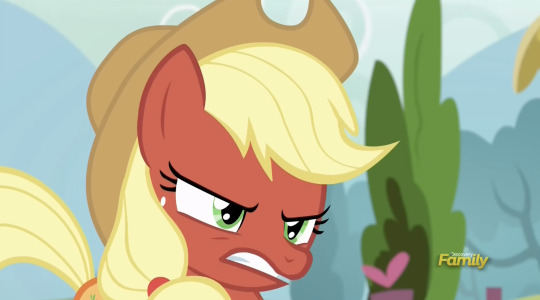
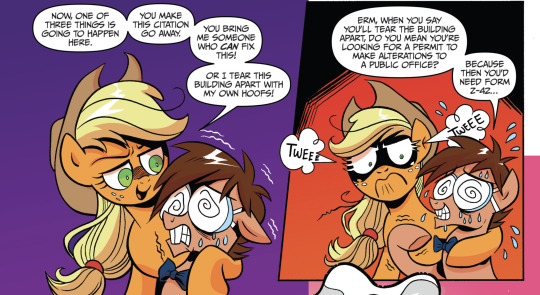
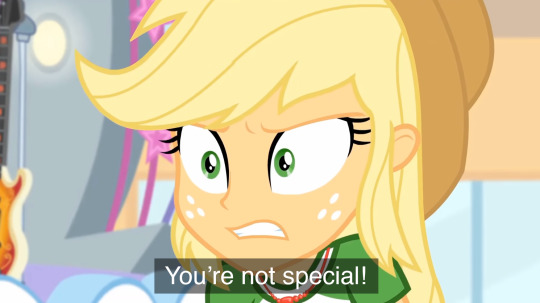
Subtextually, a lot of these flaws and anxieties can be (retroactively) linked to her parents' death, forcing her to grow up too quickly to become the adult/caregiver of the family (especially after her big brother becomes semiverbal). Notice how throughout the series, she's constantly acting as the "mom friend" of the group (despite everything, she manages to be the most emotionally mature of the bunch). Notice how AJ'll switch to a quieter, calmer tone when her friends are panicking and use soothing prompts and questions to talk them through their emotions/problems; something she'd definitely pick up while raising a child. Same with her stoicism and reluctance at crying or releasing emotions (something Pinkie explicitly points out). She also had a childhood relationship with Rara (which, if you were to give a queer reading, could easy be interpreted as her first 'aha' crush), who eventually left her life. (Interestingly enough, AJ also has an angry outburst with Rara for the same exact reasons as with EQG Rarity; jealous, upset that someone else is using and changing her). It's not hard to imagine an AJ with separation anxiety stemming from her mother and childhood friend/crush leaving. I'm also not above reading into AJ's relationship with her little sister (Y'all ever think about how AB never got to know her parents, even though she shares her father's colors and her mother's curly hair?).
AJ's stubbornness is a symptom of growing up too quickly as well. Who else to play with your baby sister when your brother goes nonverbal (not to discount Big Mac's role in raising AB)? Who else to wake up in the middle of the night to care for your crying baby sister when your grandma needs her rest? When you need to be 100% all the time for your family, you tend to become hard-stuck with a sense of moral superiority. You know what's best because you have to be your best because if you're aren't your best, then everything'll inevitably fall apart and it'll be your fault. And if you don't know what's best –– if you've been wrong the whole time –– that means you haven't been your best, which means you've failed the people who rely on you, which means you can't fulfill your role in the family/society, which makes you worthless . We've seen time and time again how this compulsive need to be right for the sake of others becomes self-destructive (Apple Family Reunion, Sound of Silence, all competitions against RD). We've seen in The Last Roundup how, when no longer at her best, AJ would rather remove herself from her community than confront them because she no longer feels of use to them.
But I guess it is kinda weird that AJ has "masculine" traits and isn't interested in men at all. It's totally justified that an aggressively straight, misogynistic male fandom would characterize her as a "boring background character." /s
At the time of writing this, it's 4:46AM.

#mlp#yeah i wrote this last night during insomnia.#yeah i know an embarrassing amount of crap about this kids show#but whatever it's my hyperfixation i'll store as much useless information as i want!!!#i'm gay and neurodivergent i have an excuse#in case you needed more proof that aj's my favorite character#personal#delete later#unless you like this analysis stuff#i get why they didn't reveal aj's parent's death until way later and why they didn't do much with it but i wish they did#cuz narratively there could've been so much material with aj's grief. like. i feel like we gloss over the fact that she lost her#mother and father as a teenager#i tried keeping my personal hcs out of this to keep it unbiased#but i'll put some in the tags#involving rarijack –– i think aj can be (but not always) very self-conscious about her relationship with rarity#anxieties that she's not the right fit or that rarity will move away and leave her some day or that another woman will take her attention#(like in rollercoaster of friendship?? nudge nudge??). basic seperation anxiety stuff#long post#regarding applebloom whenever i think about her and her parents i think about that scene in steven universe where steven looks up at#a portrait of his mother and openly wonders what kind of sack lunches she would've made for him. that episode still fucks me up
7K notes
·
View notes
Text
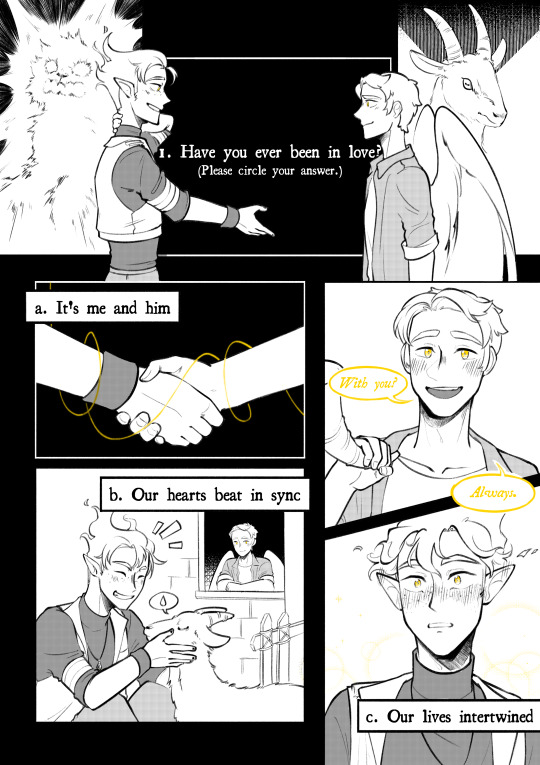
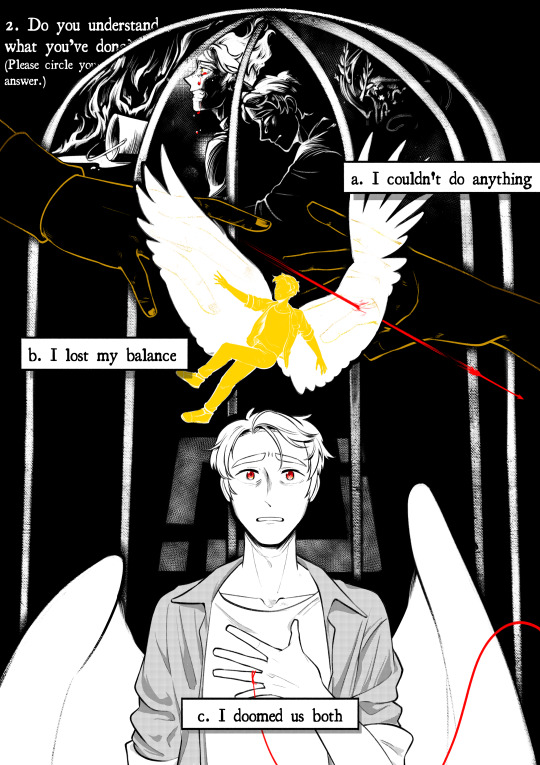

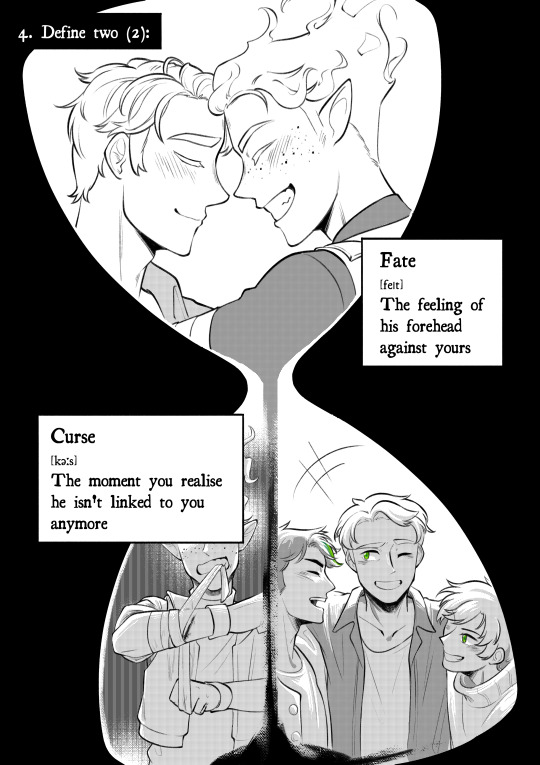
You have 90 minutes to complete. (original poem: r.a.)
In participation of the MCYT Recursive Exchange 2024 hosted by @mcytrecursive!
Inspired by know that all my love will be your breath (i will save you when your lights go out)
[text under cut]
1. Have you ever been in love? (Please circle your answer.) a. It's me and him b. Our hearts beat in sync c. Our lives intertwined
2. Do you understand what you’ve done? (Please circle your answer.) a. I couldn't do anything b. I lost my balance c. I doomed us both
3. It's been god knows how long since you felt phantom hands on your neck and there is no one in sight. If you were soul-bound to him and both of you died at the same time then why are you still waiting in the void? Please answer clearly, in full sentences. (Not a correct answer:I just wanted to see him one more time).
4. Define two (2): Fate | The feeling of his forehead against yours Curse | The moment you realise he isn't linked to you anymore
5. True or False: i. It was your fault. ii. You wish you had met him under different circumstances. iii. You can’t regret a single moment that you had him. iv. You would do it all over again if you could. v. It ended long before either of you said anything.
thumbnails:

sketch cover thing for imgur link:

#team ranchers#team rancher#rancher duo#jimmy solidarity#tangotek#trafficshipping#mcyt recursive exchange#events#fic fanart#my art#“canary has butterfly-shaped wings it cant do a dramatic spread like that” watch me. (draws dramatic wings) (sorry)#“you have 90 minutes” have been rattling in my brain for so long ever since i suddenly remembering a web weave using it (yes the beeduo one#very glad i can release it (using it in art) from its confines (my mind)#hm i suppose the title would be more in theme if its abt limited life ranchers#← havnt watched limlife yet#but! happy with what i come up with. lil bit proud even#had so much trouble with the panelling and layers in p2 cause it looks too busy (explodes)#also punching the floor bc i only noticed the “yes-no” pair(?) in the original poem when im already half-done w/ the comic#me when making silly comic makes you do poem analysis#i dont even go there ← does not have enough poetic braincells
4K notes
·
View notes
Text
Okay, so we know that Charles' polo goes red>burgundy>black and back by the end of the season.
Because there's so much going on, I always missed the exact transitions. This time I specifically tracked them down. (Apologies if this has already been done.)
Charles shirt is bright red through the majority of the Devlin House, even in Hope's Diary scene, when he opens up to Crystal.
Even when he first swings at Mr. Devlin and gets knocked back, his shirt is red.

The very subtle shift to burgundy is after he disappears and first reappears in the loop.

It remains burgundy throughout the entire lighthouse leapers episode and beginning of the two dead dragons.
I finally realized the very last moment we see of Charles in the burgundy is with Crystal. She tells him after the confusing makeout night, "But I think we should be friends," and kind-hearted Charles, of course, respects that and puts on a friendly smile.

It's difficult to see in the next scene with him because of his jacket, the angle he sits at on the ladder, and the lighting, but it's immediately after that when we first see him in the black polo.

My brother in death, you are NOT doing well.
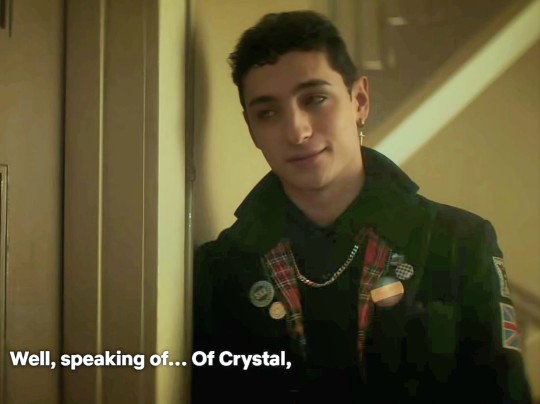
here's another song from Jayden Revri's official Charles playlist, that I think is about this conflict with Crystal:
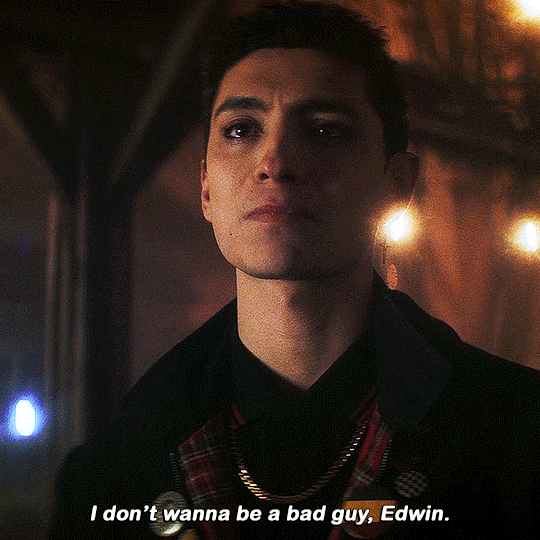
His shirt is still black during the "I don't wanna be a bad guy" scene.
After Edwin's affirmation of Charles' inherent goodness, it is directly after this scene that the shirt goes back to burgundy!!!

He's still wearing the burgundy during the confession:

BUT IT GOES BACK TO BRIGHT RED LITERALLY RIGHT AFTER EDWIN'S CONFESSION AND THEY ESCAPE HELL TOGETHER!
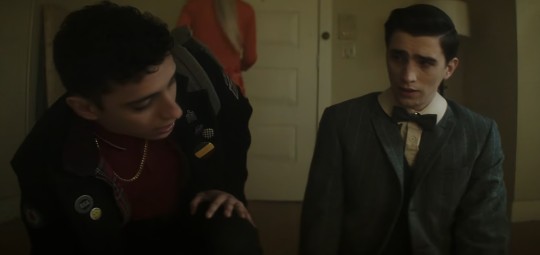

Yo I equally love Cryland and Payneland but the show canonly said "Crystal hit him in the loneliness and Edwin hit him in the loved"
#Spotify#text post#charles rowland#crystal palace#cryland#love cryland but i do accept the misunderstanding conflict angst#costume design#dead boy detectives#dbda#dead boy detective agency#makeout scene#but i think we should be friends for now#the case of the devlin house#the case of the lighthouse leapers#the case of the two dead dragons#scene analysis#reference#if this has already been pointed out sorry but these are for my own notes at least#the case of the creeping forest#the case of the very long stairway#dude i've never been this emotional about a fucking shirt before#this fandom is literally unravelling my sanity#the case of crystal and charles#fandom resource#research
1K notes
·
View notes
Text
I'm rewatching Arcane, and after my third time seeing season 1 I had a hot new reading on Viktor's scenes in episodes 6, 7, and 8.
Like a lot of other people, I felt it was weird and unsavory that Viktor - very close to death with a disease that affects his lungs - suddenly starts experimenting on his disabled leg. Those two things have nothing in common, save for the fact that the cause of both might have been the toxic fumes of the undercity, which could have resulted in Viktor being born disabled if his parents were also subject to those conditions.
So why does Viktor try to "fix" his leg when his main goal is to utilize the Hexcore to prolong and improve living conditions before he's gone?

Viktor in acts 2 and 3 is motivated to save himself long enough to make a difference in the world. Even though Hextech is revolutionary for Piltover, it hasn't reached who Viktor wanted to help this whole time, the disenfranchised in the undercity. In his mind, he hasn't done enough to change the world for the better, and he will be gone before he has the chance to do so.


After realizing the Hexcore responded to organic matter when it absorbed Viktor's blood, he experiments with plants, only to find that they wither and die soon after the Hexcore makes them grow.

This causes him to visit Singed once again for anything that could help him figure out how to use the Hexcore for magic that could save lives, one last shot at accomplishing his dreams.
Viktor parted ways with with him as a child upon seeing that Singed was willing to hurt Rio, his salamander test subject, in order to prolong her life. Viktor didn't understand that cost before, but he does now, being in the same position as Singed and Rio simultaneously, both the scientist trying to make a breakthrough and the subject he needs to save in order to do so.


Like Rio, Viktor is not his own end goal to his scientific pursuits. Singed is trying to save his daughter, Viktor is trying to help his people. He's his own means to an end, and is now willing to pay the cost of getting there.
Singed gives Viktor a variant of Shimmer to experiment with, the idea being that it will stabilize an organism while the Hexcore's magic affects it, hopefully allowing it to survive through the aggressive and sudden healing process.

Viktor injects the Shimmer into his leg, as well as carving runes into both his brace and thigh to channel the magic towards there before he offers the Hexcore his blood. It does Something to his leg which we don't see till the following episode.


The new reading I have of this scene is that the reason Viktor chose his leg specifically is not because he was trying to "fix" it, but because:
-He's not willing to put others' lives at risk and knows he's not long for this world, so the only test subject he's willing to use is himself
-He knows the organic matter he tests the Hexcore on might die
-Viktor's leg is a part of his body he's willing to lose if things go wrong and it rejects the transmutation (he also knows that he could just fully die then and there too and is willing to take that risk)
Obviously, the scenes involving Viktor's experimentation center his physical disabilities (shots of his back brace, the focus on his leg) and equate them with the disease that is literally killing him. The narrative lens shows us that Viktor "curing" himself begins with his disability, which sucks.

So while the boat scene undoubtedly is written to be "triumphant" because Viktor's leg is no longer disabled (shown by him dropping his crutch, the swelling music, the parallel to the scene where a child Viktor can't keep up with his toy boat), a different reading is that it's another experiment to him.
Viktor is stress testing the organic matter he infused with magic, and the scene is triumphant because he's realized his leg isn't deteriorating or weakening - it holds up. The mutation of the magic in his leg survived. It's a sign that maybe he can use the Hexcore on the rest of his body, keep himself alive long enough to do what he's always wanted to do: leave a legacy that changes the world for the better.
To me that's a much more in-character perspective for Viktor in these scenes than what is being said narratively through directing, framing, music, etc. Previously, Viktor had never expressed distaste for his disability as an adult, only commenting on it as a part of why he was isolated socially from Piltover. To me, him testing the Hexcore on his leg is merely an indifference to its current state, rather than a preference to have it changed. I don't even necessarily think it'd be a bad thing if Viktor did outright say "I would like to not be disabled", because I'm sure many other disabled people feel that way from time to time, but season 1 really does a poor job of pushing that framing of "curing" disability onto a character that did not express those perspectives himself at this point.
It gives off a big ol' "aw, poor Viktor, not only is he dying because of the political landscape that leaves disenfranchised people to suffer preventable diseases, but he's got a disabled leg too!" One of those things is much more problematic than the other lol.
Season 2 definitely hurtles Viktor very quickly into the Machine Herald perspective in which he thinks humans must evolve past ANY limitations of their original bodies, but to me season 1 Viktor just doesn't feel that way about himself. His primary concern has always been rooted in how to improve the lives of his people permanently, and it's only when he's actively dying that his secondary goal is to live long enough to see that happen.
It's something he drops completely after his experimentation results in Sky's death. He's immediately spiteful of the Hexcore and tries to destroy it - and himself.


Viktor now accepts that he will die before he's able to change the world the way he wanted, and hides the fact that he fucked with his body from everyone as he awaits his demise. "Fixing" his leg is not something he celebrates in and of itself, it's now only a reminder that the pursuit of his dream resulted in someone else's death.
The narrative does well in season 2 to frame Viktor's Glorious Evolution as a Bad Thing at least, and Jayce's speech at the end about Viktor never being broken is extremely valuable and important, but it's just weird to see him say this:


Cause to me now, that ain't what Viktor was trying to do at all! The writers may have retconned that to be the case, which is fine, whatever, but season 1 in isolation does not support that idea to me after this rewatch.
Overall, I think Arcane can have confusing directing sometimes that focuses on evoking feelings and themes rather than the richness of its characters, their dynamics, and the world they inhabit - to the detriment of all the above. In season 2, this resulted in a lot of scenes that felt emotionally unearned or muddy to me, like pretty much everything with Jinx, Vi, and Vander together rip.
It's for this same reason that I think it took me so long to really come to this reading of Viktor's season 1 scenes, because the directing bias REALLY wants to make you feel sorrow and hope alongside Viktor, even though it means he'll seem to randomly start equating his disabled leg to his illness. It just felt like a weird disparity to me until I watched these episodes again and was like "wait" lol.
Anyway peace and love on planet Earth I cannot stop thinking about Viktor Arcane
#oogway voice: mmmm...viktor#viktor#arcane#arcane spoilers#analysis#i was watching these episodes last night and i teared up when he came back on screen in one scene. he wasnt even doing anything sad#it was just a shot of his face but i was like. oh my god i love him so much#its bad#long post#text poasted#posting this on my art account so i can lure you into looking at my viktor art (there is more incoming)#i also 100% feel like viktor being the mage that jayce met as a kid was also retconned cause if you think about it for 2 seconds#the logistics get very confusing#but who cares jayvik nation forever#thats beside the point
455 notes
·
View notes
Text
i think one of the most noteworthy things about Blaise that i haven't really seen anyone discuss is his tendency to liken others to children, his weaponization of it, its relation to him being a child abuser, and its relation to his defeat.
one of his first lines of dialogue, before he even introduces himself, is him humiliating Franziska by calling her 'little von Karma', and then bringing up something retroactively embarrassing she did as a little girl.


he frames this as genuine nostalgia, but to me, it's pretty clear this was a purposeful, and almost sadistic, powerplay.


there's also these lines. these aren't too strange, out of context - "let's all play nice" is a relatively common phrase, and in the second screenshot where he's discussing Kay and Edgeworth's friendship, they are literally youths (well, compared to him). but in context, it's clear that this is part of him attempting to assert his dominance over everyone else.
he wants to let everyone know that he is the adult here, and all they are is children - and thereby, they are completely powerless to his end-all authority, so they shouldn't even bother attempting to resist. this is further emphasized during his logic chess segment.




he calls Edgeworth 'my boy', he reminds him that he is his 'senior in life', he tells him he's being naïve. he threatens to never give back his prosecutors badge if he doesn't stop trying to question his authority. he asks him, mockingly, if he's scared. then, while grinning, he tells him that there is nothing he can do, and he should give up already.
he once again, more blatantly this time, is attempting to force someone else into accepting that they are the weaker party and that he could do anything he pleased to them, and once again, he is weaponizing the societal power imbalance between a child and an adult to do so.
i could go on and on for a while with more examples of this, but then that would make this post really long and rambly. so, instead, i'm going to discuss what his behavior ultimately results in.


this is probably one of the most disturbing interactions in Ace Attorney.
he does this purely so Sebastian will feel humiliated and ashamed in front of his colleagues, people he respects and who in turn are supposed to respect him. he does this to remind Sebastian that he is his father, and Sebastian is his child. to Blaise, that means he has complete control over him. and until this point? he actually does.
he has controlled every aspect of Sebastian's life to be exactly how he wants it. his path in life, his school, his tests - even Sebastian's constant usage of his surname serves as a reminder that Sebastian's only purpose to his father is to be an extension of him, a tool to feed into his ego. an object. something he owns.
note how, in their sprites, Sebastian is typically tilting his head slightly downwards, and in his crying sprites, he's leaning down. meanwhile Blaise stands high, and in his grinning sprites, his head is tilted up, as to literally look down on the person he's talking to.
but in the end, right before Blaise is convicted, right as Blaise tells him he should just remain his idiot son, Sebastian is looking up as he tells him goodbye. a way of saying that he's not beneath him, and he won't let him act like it anymore.
Blaise is immediately infuriated by this, and says all you've ever been able to do is depend on me. he screams Sebastian's name in anger - but it's cut off.
in fact, there is no more dialogue from Blaise after this. because he has no more authority, no more ability to scare Sebastian or anyone else into submission. in the end, Sebastian has finally taken back his autonomy that Blaise has robbed him of. so has Kay. so has Simon. all of them are children he has mistreated, threatened, and jerked around for his own selfish gain, but ultimately, they all still have more power over their own lives than he ever will again.
there's a lot more i could say on this, but these are all my thoughts i could organize. thanks for reading.
#uhhhh i don't make many analysis posts so let me know if this is all just disjointed rambly bullshit#originals#speech#ace attorney#aai2#aai2 spoilers#gk2 spoilers#ace attorney investigations 2#blaise debeste#sebastian debeste#child abuse#ask to tag#long post#VERY long post
916 notes
·
View notes
Text

My Lawyer is going to Get Your Ass.
[First] Prev <–-> Next
#poorly drawn mdzs#mdzs#jin guangyao#jiang cheng#nie huaisang#wei wuxian#lan wangji#elle woods#That's right. All this time I was building up towards this punchline.#The pink legal eagle Elle Woods is canonical to the PD-MDZS universe. This will make no sense if you are new around here.#The phone lwj pulls out of his bag of holding has one function. And it's to call Elle Woods. An omniscient and legendary cultivator.#The mandarin is very messy but probably self explanatory. I can only hope it is legible...#Referencing Danganrompa (Sore wa chigau yo!) and Ace Attorney was not on my bingo card for things I would end up doing-#-but it has happened and I am rolling with it. Even if it means a lot is going on in this comic!#the core joke here is that wwx finds himself in a impromptu court and gets a lawyer involved.#A lawyer AU fits these characters so well I am once again blinking long and slow at everyone who’s made an AU for it#Not a single whisper of story analysis in these tags today. It's pure whimsy on the menu.#I am placing a little treat outside of your door. It's a cold world out there and there is so little whimsy to be found.
2K notes
·
View notes
Text
Deeply obsessed with how Anthony Bridgerton will do anything and everything for the vibes, the ambience and to set the mood for his wife
Why did he lift Kate up halfway to the ceiling just to simply set her down on the desk? THE MOOD, THE AMBIENCE, THE VIBES




Why did he scatter the papers after setting her down as opposed to clearing the desk beforehand? THE MOOD, THE AMBIENCE, THE VIBES
Because of course scattered papers are an essential aspect to heir-making on a desk!!!
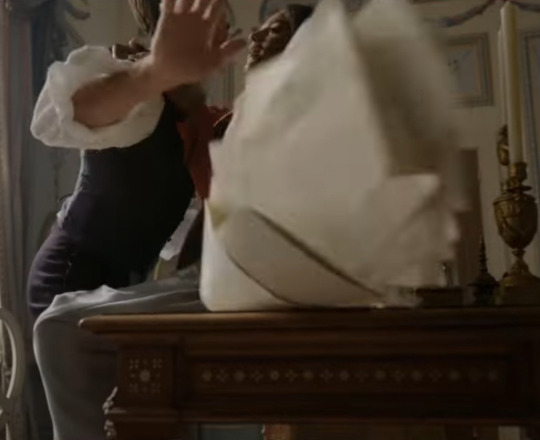

#bridgerton season 3#anthony bridgerton#kate sharma#kate sharma x anthony bridgerton#kanthony#bridgerton#bridgerton analysis#no but modern kanthony au where Anthony routinely turns off the lights and fans to have a candlelight dinner with Kate#and when she points out that there’s really no need to do all this especially when it’s summer and they are sweltering#he’s all#it’s for the AMBIENCE KATE#and she gives in because it really is very sweet how he always goes the extra mile for her#for Kate who’s afraid of being a burden of even slightly inconveniencing people#because she’s afraid to find out that they’ll decide she’s not worth the trouble after all#and here comes Anthony who’ll create extra miles to walk#simply because he wants to keep walking with her forever and always#Anthony who considers an extra mile not a burden but a privilege as long as it’s for her#yes let us all cry together
451 notes
·
View notes
Text
Sonic is fundamentally unrelatable and unrealistic - and that's a good thing
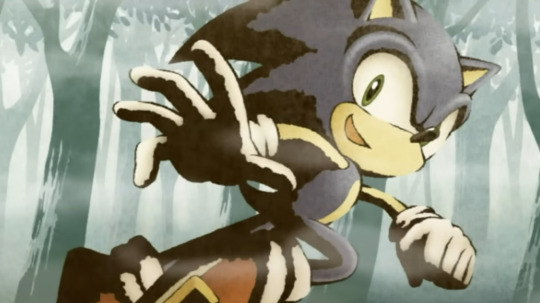
I want to address a common sentiment in the fandom that I've seen countless times over the years - the idea that Sonic should be more humanlike. Specifically, the idea that Sonic should have more human traits, such as anxiety or insecurities, that make him emotionally vulnerable in some way.
I have always felt that this sentiment strips away what I love about Sonic so much—that it goes against his character as someone who is meant to be inspirational rather than relatable. From the bottom of my heart, I truly believe that making Sonic more relatable ruins his appeal and misses the entire point of what role he is meant to fulfill. Sonic being the way he is, an inhuman being that is extremely strong and unyielding mentally and emotionally, makes him an inspirational character that is appealing outside of the realm of relatability.
Please note that I am discussing Game Sonic for this essay, not any versions of Sonic from spinoff media.
(Special thanks to @blurredblu for helping me write this essay!)
Relatability =/= likeability
First, it is important to define "relatability" for the rest of the essay, as what is seen as relatable can vary across countless different cultures and lifestyles.
In this case, we are discussing facets of the human psyche. Traits such as emotional vulnerability, insecurity, or trauma are traits seen as humanlike because they imitate the depth of the human mind. They come across more realistic, and thus relatable to people in real life who have generally gone through emotional hardships.
Relatability is also considered with the implied audience in mind, according to Craft in the Real World by Matthew Salesses.
If relatability were somehow a goal of craft, then the question should be: How can a writer go about trying to make a piece of fiction relatable? If we mean “relatable” as sharing a reader’s experience, the first place to go is audience. We must always ask: Relatable to whom? Which brings us back to the elephant in the room—to call a manuscript “relatable” is really to make a claim about who the audience is or should be.
When writing relatability in fiction, what is important to recognize is who the target audience is. Sonic is a character that was initially created to appeal to a wide target audience, not only meant for young boys but for girls, women, and an older age range in general. When it comes to marketability however, Sonic is almost always advertised towards children, and this demographic is the most pertinent when we look at versions of Sonic written with relatability as a goal. With this idea of the target audience in mind, a character who is portrayed as young and having a childish temperament would be more relatable. The Paramount Sonic movies are a great example of a version of Sonic explicitly written to be relatable to the target demographic on a broad level, heavily influenced by the culture that the movies derive from: specifically a middle-class, suburban, small-town vision of American life. Sonic is portrayed as dependent, inexperienced, and abiding by a nuclear family structure who idolises many elements of American popular culture, such as Keanu Reeves or Marvel/DC superhero comics. Compare this to the games, where Sonic is shown to be self-supporting, wise, and living life as an unfettered vagabond, all without a trace of any pop culture utterances.
In other words, Sonic was created to be the height of unrelatability to his target audience.
It is not lost on me that the prevalent desire for Sonic to behave realistically ties into the idea that the goal of crafting a good character is to emulate realistic human characteristics. A character's relatability is what allows audiences to connect with the character, which is considered unequivocally a good thing.
What is forgotten in this rudimentary line of thinking is that characters in media need to fulfill a role. Characters are not people like you or me, but fictional creations made to serve a particular purpose. There needs to be thought put into what narrative role the character fulfills and why they are portrayed a certain way to the audience. Hence, there must be a reason for the relatability, instead of employing it haphazardly.
To quote Craft in the Real World once more:
"readers’ expectations for fiction are created by their previous experiences with fiction—in other words, by culture."
The desire for Sonic to be relatable can be attributed to people recognizing pervasive tropes present in their previous experiences with fiction, internalizing these commonalities as the correct way to write good stories, and assigning these to Sonic as a result. While I can understand the logic behind this thinking, it is crucial we don't limit our appraisal of media by saying a protagonist ought to abide by a certain limitation, when it's the breaking of rules, however rigid they are, that allow for different methods of storytelling. Sonic breaks the so-called rule that a protagonist must be relatable, and it's this unrelatability that enhances and strengthens the narrative in many Sonic games. In other words, writing Sonic in a relatable way can be a way to write him; that does not mean it is the only or correct way to do so.
We should bear in mind that there are usually financial incentives to cast characters as mentally or emotionally relatable to audiences. To create a protagonist that appeals to all audiences to maximize revenue, the solution is typically to make them broadly relatable. While this can be a successful formula, it is important to not apply it to media indiscriminately. If a myriad of works all prioritise having characters be relatable over what makes them unique, you may end up sacrificing creative integrity for the sake of following a trend. In Sonic's case, you would lose the inimitable appeal that makes him stand out. While relatability can be valuable in certain contexts, it should not dominate all other considerations of writing a character, especially when it is done for the purposes of profitability as opposed to earnestly conveying a character to, ultimately, tell a story.
What makes Sonic stand out
What, then, makes Sonic stand out as a character? His inhuman mental fortitude. In a wide and varied cast of characters such as the Sonic cast, each with their own unique emotional struggles, Sonic stands out as the sole character with no struggle. He has no weak point, no Achilles' heel. Though he is weak to water, that is only a physical weakness. Mentally, he is too strong for anything to affect him long-term.
As stated before, characters are designed to serve specific creative purposes. In Sonic's case, his striking mental resilience is to highlight other messages and characters in the story. This is because Sonic usually plays the guiding or support role in his stories. He is not the sole focus. There is always at least a second character that the story focuses on to highlight that character's problems and struggles, and how that character ends up overcoming that conflict, often with Sonic's help.
With all this in mind, would Sonic stories be improved if Sonic was, instead, a human-like character with human flaws and insecurities? Or would this muddy his core concept and require all Sonic stories to be changed unrecognizably to fit this new, different character?
Sonic has no backstory - and that's a good thing
Understand that this section is not an attack on backstories in general. For the most part, backstories provide insight into a character's motivations and personality. They are effective in accomplishing what they were meant to do - creating characters that are meant to be realistic.
Sonic is not meant to be realistic.
Yuji Naka once stated the reason behind Sonic's lack of a backstory in an interview: if you uncover all the mysteries, then the character will become uninteresting.
Very little information of Sonic's backstory has been revealed. We know that he is from Christmas Island (same interview link as above) and it is implied in the Sonic 1 manual that he and Eggman already know each other and have been regularly tussling before the events of the first game. These are vague and unspecific details that are not brought up in Sonic games at all, and for good reason.
Distance is required to portray a character who you are meant to be separate from rather than analogous to. Maintaining a certain level of mystery around Sonic creates intrigue, as a question is begged but never answered or even brought up in Sonic stories. This is because Sonic's backstory has no relevance on the narrative and delving into it is not necessary.
Sonic's motivations are simple and straightforward. He likes to run and go on adventures because it's fun. He likes to help people not out of some heroic obligation but because he wants to do what he feels is right. There is no need for a backstory to explain Sonic's motivations when they are plainly presented to you in such an uncomplicated manner, and what's on the face of it is just wholly what it is.
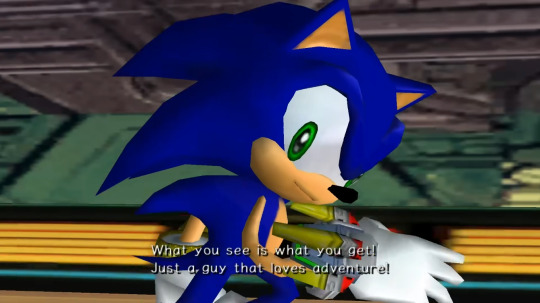
Sonic is also a character that remains static rather than having a major character arc. While he can grow when it comes to things that don't affect his overall character, such as Sonic learning and overcoming Shadow's Chaos Control technique in Sonic Adventure 2, he has no emotional conflict to overcome. He has been a fully realized character since the beginning of the franchise.
Compare this to a character like Tails, whose character arc is about him being bullied for his two tails in the past and being inspired by Sonic to be more confident in himself, as communicated in the Sonic 2 manual and his Sonic Adventure campaign. Divulging Tails' backstory is necessary for the improvement of Tails' circumstances and confidence levels to be effectively communicated in the story.
Fictional characters are narrative devices created to tell a story. They are not real. Again, there must be narrative reasons for them to be the way they are.
Providing Sonic's backstory would serve no narrative purpose—none that would serve the themes his stories and character are meant to serve, at any rate.
Sonic has no trauma - and that's a good thing
Upon analyzing Sonic's character in the games for so long, it has become astoundingly clear to me that Sonic does not have an ounce of mental trauma from everything he has been through. This should not be seen as a bad thing, but rather a well-thought-out and deliberate decision that serves to reinforce the role his character serves.
In the face of situations that would be considered stressful or traumatic to the average person, Sonic remains unfazed and even excited. There are countless examples of this: Sonic jumping from a plane with nothing but shrapnel to use as a surfboard in Sonic Adventure 2; Sonic expressing excitement that he's near an active volcano spewing lava in '06; Sonic exuberantly grinding over pits of lava in Black Knight; Sonic burning up with excitement at the prospect of dangerous stakes in Team Sonic Racing while everyone else seems to be concerned.
For Sonic, danger and near-death experiences are not a source of emotional struggle, but rather a source of fulfilment and joy. He lives life on the edge; the excitement of diving off of a plane or nearly falling into lava only fuels his love for life.
Additionally, Sonic also enjoys the simpler pleasures of life. Exploring the world. Reading books. Going on relaxing vacations. Racing through open fields. Life is one big adventure and Sonic is having a blast living it.
The idea of Sonic having some kind of secret, hidden trauma that he hides under the guise of a fake smile can be a fun fanon trope, but, for the purposes of canon and official Sonic stories, there are clear reasons why they should stay as fanon. If Sonic had trauma, it would undermine his unrelatability and make no sense given his role in his stories. Tropes such as Hurt/Comfort and Angst are ubiquitous when it comes to fandom culture, and this could be a case of those tropes appearing in the Sonic fandom simply due to the nature of fandom itself. Enjoying fanon in and of itself is all well and good, but advocating for it in canon will homogenize it by stripping away what is unique about the media we love.
In the end, there is no reason to believe that Sonic pretends or does not behave genuinely when it comes to expressing his true emotions. Sonic simply has nothing dark inside of his heart to hide. This is confirmed in Unleashed, where Sonic's heart is strong enough to resist the negative emotional forces of Dark Gaia without him even realizing. The subconscious nature of the action combined with his humility even leads him to initially think it to be Chip's doing. His heart is so strong and so pure that it is incorruptible by negative forces. This shows how Sonic's resolve is effortless and practically baked into who he is.
Sonic's internal strength is completely unconscious on Sonic's part. He doesn't actively try to be the way he is. He just is.
Sonic doesn't cry - you get the idea
It has become a hot topic in the fanbase in recent years that Sega once provided a revision note for Sonic to not express excessive emotion such as outwardly crying or sobbing.
This idea has generally been met with hostility and aversion from fans. However, this negative reaction has always confused me, and I hope to offer a different perspective to the issue.
Why does Sonic need to cry?
Let's expand on this argument for fairness' sake. A common rebuttal grants that Sonic doesn't usually cry. But in extremely emotionally difficult situations, such as loss or mourning, Sonic should cry because it is only natural to cry in such a situation.
Again, I want to challenge this notion. We could approach it from the angle of human psychology and behaviour—it is far from the case that everyone cries in response to severe adversity, belatedly or otherwise—but instead I want to explore this with respect to the narrative angle we have covered so far. Specifically, with respect to the idea that characters, unlike you or me, are designed and portrayed with certain purposes in mind.
Why would it be natural for Sonic to cry?
To help understand Sonic's handling of loss, let's analyze four examples from the series of Sonic losing someone.
In Sonic Adventure 2, Sonic stays strong and composed right after Shadow's presumed death, paying respect to his fallen ally.
In Sonic Unleashed, after Chip leaves him, Sonic takes a deep breath before moving forward with a smile on his face.
In Sonic Battle, Sonic is desperate for Emerl to live and expresses this openly.
In Sonic '06, Sonic expresses a great amount of despair when Elise dies in an explosion aboard the Egg Carrier.
It is clear from the outset that Sonic is not an uncaring individual - he wouldn't do all the selfless things he does if not because he didn't care about people. He also still feels strong emotion at losing those close to him, but he handles those emotions with a great deal of fortitude. In Adventure 2 and Unleashed, his reaction is more subdued, while in Battle and '06, it's clear that Sonic is upset and isn't afraid to show it. The difference could be due to that in the prior examples, Sonic watched them die in front of his eyes, while in the latter examples, they were already gone by the time we see Sonic's reaction.
Nevertheless, Sonic feels emotion. It is only because he does not express himself in an adequately typical way that this idea is met with so much outrage and pushback. Because Sonic does not cry, and because an expected response in certain scenarios would be to cry, it is perceived as a writing mistake that must be fixed. Sonic is perceived as a bad character because he does not fit into a rigid box of socially acceptable expressiveness.
But why is Sonic acting outside the norm necessarily a bad thing? The fact that Sonic can go through such hard situations and remain positive is a testament to his strength. The fact he doesn't cry makes him come across as superhuman when it comes to mental fortitude. That is not a mistake of his character that needs "fixing." That is the entire point.
The animosity towards the idea of Sonic not crying, that he must express himself a specific way, a distinctly normal and humanlike way, is stirred from the irrational, yet sadly common, leap in logic that Sonic must behave and experience life like you or me.
There is an irony, too, to how localised this demand of realism is of Sonic. I've seen no outrage demanding that he spill blood or break bones like us. But, apparently, he must shed tears to be a good character. Sonic is superhumanly resilient while running, or fighting, or taking on the miraculous powers of the Chaos Emeralds. Chaos is power and power is enriched by the heart. Sonic's is shown to be one of the strongest and purest out there, one that moves ever on from and through the pain of loss, grief, and tragedy. Isn't it bizarre, then, that this is considered a defect to him?
The messaging of Sonic
Sonic's core concept as an inspirational character must be maintained because it is key to the emotional messaging of nearly every single Sonic game.
Right from the very first game, you play as a plucky little hedgehog, fighting against the tyranny of Eggman's industrialization threatening to destroy all life on the planet.
Sonic is small and unassuming. But he fights anyways, determined to stop Eggman. And he does.
This concept remains throughout the franchise. Sonic always remains steadfast in the face of great adversity. From Sonic CD's "You Can Do Anything" vocal theme telling the player to believe in themselves to simple yet motivational phrases—ones that Sonic himself has given to the likes of more normal characters such as Elise: "If you have time to worry, then run!"
There is even a quote on the Japanese box art of Sonic & Knuckles comparing Sonic to the Sun, the far and unreachable star in space that our entire galaxy revolves around.

We look up at the Sun like how we look up to Sonic.
As brought up earlier, Sonic is the antithesis of relatability to his target audience, children.
This is because he is meant to inspire children.
The fact that Sonic remains so popular and successful to this day is undeniable proof that relatability is far from a necessary ingredient for likeable characters. Given the fact that Sonic is such a strong-willed character, that he fights endlessly against adversity with a smile on his face, that he always gives positive words of encouragement, is it any wonder why he is so popular with children? Sonic is a wonderful role model that promotes living life to the fullest. Sonic is deceptively wise, seeming to know simple yet effective solutions to every problem. Sonic encourages you to chase your dreams, to stay strong through hard times, to enjoy life.
Sonic is a friend who is always there for you.
Not only does Sonic provide guidance to characters, he provides guidance in the real world as we navigate our lives and the trials and tribulations that come with them. Each character that presents a problem is the character we are meant to connect with, and Sonic is who we strive to be.
CONCLUSION
I do not hold any grudge against relatable characters. I love them, just as I love all kinds of different characters in all kinds of media.
I believe that coexistence is possible. I believe that you can praise a character for their relatability and realism, just as you can praise a character for being the antithesis of both of those things, and these do not have to be contradicting principles for one to have. It all depends on a character's narrative function and how their character traits – both relatable and unrelatable – serve the story that is being told.
Sonic the Hedgehog is a character whose role in the narrative is to inspire and guide other characters. From a Doylist perspective, he represents the prominent, all-embracing messaging about staying strong and positive despite all odds, inspiring and guiding his target audience.
Every decision put into Sonic's character traits serve his role perfectly. Of course this extraordinary character does not behave like you or I do. Why would he? That's simply not his nature; a gust of wind in the breeze, moving endlessly all throughout the world. A pure and positive heart who has achieved the innate desire of all humankind in a way that we will never truly understand, free from the burdens of human nature. Freedom.
Sonic is unrelatable and unrealistic. And he is an amazing character.
#sonic the hedgehog#sonic#essay#sonic characterization#sonic fandom#long post#sonic analysis#my first time writing and posting an essay online about sonic!#i've come to realize that people may actually be interested in what i have to say#and i am very passionate about sonic so this was a great exercise for me
369 notes
·
View notes
Text
An analysis of the voices in Moment of Clarity
Before we get into the analysis, a little note:
1- I am mostly trying to show how the trauma has affected each voice compared to them on their normal routes. If they have deviations in other chapters and I have stated them as trauma responses, correct me.
2- I tried my best but some voices are just difficult 😭. So sorry if I couldn't give a satisfying explanation to your favourite.
Without further ado, let's begin:
Firstly, it should be noted that what exactly happened after you decided to stay with The Nightmare is something not even the voices themselves are sure about. But what we do know is that whatever the events were they were horrific. The voices have tried everything up to this point except freeing her. And since nothing was working and it was only making things worse, they are effectively useless now. Even the Narrator acknowledges that they are all extremely traumatized.
So let's see how these voices handle trauma.
1) The Voice of the Broken:
The voice of the Broken has shown incredible resilience and empathy in the past. And in this route he is somehow even more broken. He is also on the "Free the Princess" team, however he only wants to do it because he wants this misery to end. He has the most interesting explanation as to why we(the player) can't remember being here through all those lifetimes.
"Maybe you're shattered in your own way."
Ding Ding Ding. We've found the trauma response. The Broken has been shattered more than he already was. His will and empathy have run out. Where once he probably tried accepting the Princess, the Princess just shattered them further. He just wants to be done with it. As he says, "She smashes us to smaller pieces."
2) The Voice of the Cheated:
The voice of the cheated is the only voice to comment on the absurdity of us having so many voices. And he says it as if he's complaining about it. It's the only thing he can really do in that situation really. The Cheated does NOT like losing. But after complaining for so long and ultimately getting no where, he just accepts defeat at this point.
"It doesnt matter what we do. Because we always find her. And if we don't find her, she always finds us."
Subsequently he is on the "I don't fucking care what happens anymore" team. That isn't to say he doesn't want this to end. He does but he has just given up on trying to 'win' and get an ending. Effectively he wants to quit now. And he doesn't care if it's by completing the game or hitting alt+f4.
3) The Voice of the Smitten:
The voice of the Smitten has an interesting trauma response. The relation here is almost parallel to the relation Broken has with The Tower, except somehow worse. Smitten is incapable of seeing faults in the Princess. And when questioned if we really do love her after all shes done to us he tries to justify his love by saying
"To be given an ounce of kindness from something so pure would be more pure than any other love."
After we say that the voices in our head are wrong, he replies
"She is the ONLY THING that's right."
The Smitten is heartbroken. He's like that ex you broke up with but he still texts 'I love you' every night. Except the Princess has probably toyed with the Smittens love. But the Smitten can't not love her. So he decides he must become good enough to earn the love of "our cruel and beautiful godess". And the only way to do that is to free her. He doesn't want freedom he wants affection.
4) The Voice of the Hunted:
The Hunted was already one of the weaker voices mentally. Here he's just completely silent. He has like 6 lines the whole route. Which is only 1 more than the Stubborn. The Hunted is scared. He is almost paranoid. He doesn't even tell us to do this or that. He doesn't even comment on the mirror.
I personally feel Hunted was so broken that like a scared animal he decided it was better to hide. He does speak out in agreement to Cold when he says we sealed our fate by not killing her. Interestingly, the response is very minimal. Primitive even.
"Kill or be killed."
Which if you know Hunted, is not a normal response. He usually wants to run or hide. He never wants to kill, just survive. But here he says it would have been better to just kill. So whatever Nightmare did has made Hunted go from run to hide to kill or be killed. Wow! This is like prey animal that when cornered will just lash out in violence if they have no other choice. And that's exactly what Hunted is.
Now we start getting into some really interesting deviations.
5) The Voice of the Opportunist:
The voice of the Opportunist is so unbelievably broken its unreal. First thing to note is he already has an opinion. Secondly, he defends his own opinion. That isn't very opportunistic. He doesn't even flip flop like in his other routes. He's so different in this one, almost as if he's gained empathy as a response to trauma. He eve tries to comfort other voices like the Broken.
"You did your best really. There's just a pecking order."
And he is the only voice who tries explaining to Skeptic why his constant questions are bothering them. He does it in a positive way as well.
"They're good questions. Great questions even. But they just don't have any answers."
And he clearly doesn't care what the others think about him at this point. He's also the few voices that have some semblance of sense. Like when Cold tells them to be unfeeling, Oppy says,
"He's not wrong. He's the only smart one left if you ask me."
Again a very different opinion from the rest of the voices that deem Cold to be a nuisance. He's in the minority here. And yet when you return and start making choices, he's so relieved.
"I'm sure whatever you settle on, it'll be the best possible decision you could've made."
The reason he's relieved is because there is someone actually in control. There is a decision maker he can agree with. Finally, someone to try and suade. But this is still the most resolute we've ever seen him.
6) The Voice of the Stubborn:
He is probably the most fed up with everyone else's bullshit. Interestingly though on this route he isn't urging us to face the Princess. The only route where he isn't in a hurry to reach the cabin. He has completely lost the spirit to fight. If you got knocked out, this Stubborn could not revive you. He still wants to get physical, just can't. Who's he supposed to fight? The Princess? That's already been tried. The other voices? Now that's an idea.
"Shut up. You {Contrarion} were here."
Fight me. It's right there he wants Contrarion to punch him so he can punch him.
"Ugh. Here you {Skeptic} go philosophising again. It never goes anywhere."
I'm mocking you what you gonna do about it? Fight me. But it's hopeless. He can't even be bothered to instigate a fight anymore. But he's the macho man. What will the others think of him if he isn't aggresive? The truth is others don't really care. But he does. So he says to smash the mirror. Partly cause he wants to feel the spark of a fight again, partly cause that's what others expect of him.
7) The Voice of the Paranoid:
He is STRESSED. To the point he's constantly thinking about the Princess. He only has one goal in mind. Free the Princess. Escape. Get out of here. Make the thoughts stop!!!!
Such a precious broken boi. He just wants peace. He states,
"(Freeing her) It's the only way to get our thoughts back."
He can also feel eyes on him. Not sure if that's just Para being Para or due to trauma. But he is growing restless because of it.
"She's watching us. She never stops watching us."
He also doesn't talk much. Like he's scared the princess will hear him. He was always quiet but he's unnaturally quiet. He also really really wants to free the Princess. Overall he's Paranoid, can't think about anything except wanting to free the Princess so he can have his thoughts back.
8) The Voice of the Contrarion:
Contrarion has always been a nihilist. Nothing matters so let's just have fun cue laughter. However, here we can't really have fun. So his attitude becomes, nothing matters cue laughter. Which just makes him seem so sad.
"There's no difference between fine and not fine. It just goes on and on."
We know that Contrarion does hate himself. But here he's trying so hard to hide it here. He does not want to look at himself. He doesn't even want to think about himself. When Skeptic starts to question identity. He's also been asked this before but he would rather look away than look at himself.
"Yes this is far from the first time you've asked us about consciousness. (In a mocking tone) 'Who am I?', 'What am I?'; (Angrily) What is 'I'? Who even cares."
The Nightmare has broken him so much but he'd rather ignore it. When the voices are telling us what to do with the mirror in the cabin, he says
"Just go around it."
He's so done with himself. He doesn't even want to look at himself. He thinks that the most disgusting thing he could see HIMSELF. Not only this he tries to dodge almost every question we pose.
"What does here even mean if you think about it?"
He doesn't want to acknowledge anything even remotely related to him. Where was I? It doesn't matter, nobody really cares about me.... atleast I don't.
9) The Voice of the Cold:
The voice of the Cold has barely been affected. Makes sense. But what's interesting about him is he has actually been affected. He either doesn't know or he is purposely ignoring it. He has become more irritable. He develops a form of empathy. He has some pity.
" I've tried to keep them numb but they are all too soft. A shame, really."
That doesn't sound like the backseat driver Cold we know? Cold wants to help the other voices but he well can't.
"You're lucky you haven't been stuck here like the rest of them. There's no other way to keep going. You either need to forget or you need to stop feeling much of anything. They can't do either."
The Cold tried to help them. But the nature of the voices doesn't let them be helped. Cold is severely disappointed because of this. He even blames the player for ending up in this position when he says,
"You sealed our fate when you refused to kill her."
He just wants the player to make decisions independent of the voices. He's seen what they all do. He sees that it always ends in losses. He thinks the player was there when the other voices were having a try. He thinks the player was just listening to their requests.
"You always give too much space to others. It's why you always lose."
He is also the chattiest in this route. He also has many lines where he just tells us to be unfeeling. He's trying to protect us as well. But he's also bored. And he just wants it to end because he's bored.
10) The Voice of the Skeptic:
Possibly the most broken of the bunch. He is TRAUMATIZED. Normally, Skeptic is the most grounded. He's the guy who always has a plan. But here? He's useless. He realises this. And just breaks. He can't answer any question. How many times have we been here?
"Many many many many times."
Skeptic, wheres the numbers? Was I here?
"Are you your memories? Or are you the one perceiving the present moment?"
For someone who really loves answers, he sure doesn't seem to have any. The most logical voice being turned completely insane. He can't accept anything.
"Can we love something that hates us? Can we love something that hurts us?"
He's trying to distract himself. He doesn't want to think about the situation. He doesn't want to THINK. That's so bizarre. The Nightmare has broken Skeptic so much he doesn't want to do the one thing he loves to do. In fact when we reach the Long Quiet his first words are,
"I can finally think again."
11) The Voice of the Hero:
The voice of the Hero has a reaction that would make anyone furious at the nightmare for what she did to our boy. Hero is normally jocund, enthusiastic, understanding, and overall lovely. But here he is depressed. He doesn't talk much which is unusual. He always has something to say. But he's just so defeated. When the Narrator tells you the only thing you can do is go to the cabin, Hero replies
"Or you could just give up."
Hero says that. Not Broken. Hero. Our Hero. The one who is always encouraging us through our journey. The one we can trust no matter the circumstances. Our best friend. This line is the most terrifying part of Moment of Clarity. If we had any optimism going in, it had left us in this moment.
"You're lucky. What I would give to be able to forget."
Please someone comfort our boy. He deserves all the chocolates in the world.
In the Long Quiet
Once you reach the Long Quiet the voices seem to ease up a little. They see death within arms reach and think it a mercy. As Hero puts it:
"Something tells me this is the end of the line, but I don't feel bad about it. I'm ready."
Which is a striking contrast to his usual plea to not look at it. His fear of death is converted to a longing of it. Which could be seen as a another proof of why the Narrator's utopia is wrong. Because people who have lived a nightmare long for change and even death. And so he is at ease.
The Broken says,
"It feels okay."
Which is huge for our boi. Broken never feels alright. He is always sad or depressed. Something is always not okay with him. But after living through a nightmare, things finally seem okay. And so he is at ease.
The Paranoid says
"The fear's gone."
Again an amazing development. Paranoid always feels watched, and he's scared of who it is and why is he being watched. But in his final moments, living through a nightmare, he realises that the fear has no place in him anymore. And so he is at ease.
The Stubborn says,
"I'm done fighting."
This statement is a confession. He had long lost the spark for a fight, but here he can finally admit it. He doesn't want to fight anymore. He doesn't want to resist anymore. He wants to let go, and he does. And so he is at ease.
The Smitten says
"My heart feels quiet."
The fire of passion is fierce. And here it burns the Smitten. He wanted affection. He desired a connection with the Princess. His heart was incapable of doing anything but. Now as he is unraveled, his passion is extinguished. His heart is quiet. He never did get the affection he desired but realised he didn't need it. And so he is at ease.
The Cheated says,
"The game was always going to end."
For him, this is an ending screen for a rage game. He hated the experience the whole way through. He constantly faced losses. But he persevered. And so he found the ending. After all, no matter how extensive the game was, it was always going to end. He is glad he didn't quit. He got to see the ending. And so he is at ease.
The Cold says,
"I'll be free of all of you."
The worst part about this nightmare wasn't the nightmare itself. It was the fact it was hurting the ones around him. They got hurt abd yet he was as unfeeling as ever. He knew he had to be right. After all, wasn't he the only sane one left? Now as death approaches, he doesn't have to help carry the burden of others. And so he is at ease.
The Skeptic says,
"I'm ready for the truth."
The Skeptic was thoroughly broken throughout this experience. A man of reality shatters when reality shatters. And the thinker's response to doubt is to seek. But no answers were present in the nightmare. Now there is something that is very clear in purpose. Something easy to test. The mirror is death? Alright then let's see the truth. There are answers again. And so he is at ease.
The Hunted says,
"I'm ready to sleep."
An animal who has tried everything to protect itself and failed over and over again. A wounded creature who was pushed to his limits. But he is very tired now. He tried his very best. Yet it seems death is inevitable. He has remained vigilant and fearful throughout the nightmare. Now he feels safe enough to rest. And so he is at ease.
The Contrarion says,
"I'm just ready to be anywhere that isn't here."
The nightmare had shown him how low of a person he could be. He has come to associate that version of himself with those wretched circumstances. As he leaves that place behind he leaves behind his self hatred. He wants to get on with it already. He finds esteem in himself and his voice now echoes with joy and pride. And so he is at ease.
The Opportunist says,
"Boys..... it's been an honour."
The one who has never experienced true connection. The one who is constantly at odds with himself and everyone. Throughout the nightmare he garners genuine connection and empathy. He realises that the ones he should truly support are those that he loves not those that are the top of a pecking order. He finally finds that connection in this moment with the others. And so he is at ease.
And so they are at ease.
#slay the princess#analysis#voice of the cold#voice of the skeptic#voice of the broken#voice of the smitten#voice of the opportunist#voice of the paranoid#voice of the hero#voice of the cheated#voice of the hunted#voice of the stubborn#voice of the contrarian#very long post#sorry for the long wait y'all#this was so much fun#but oh boy was it tiring#enjoy
226 notes
·
View notes
Text
NO BECAUSE I DON'T THINK WE TALK ABOUT THIS ENOUGH WE DON'T TALK ABOUT THIS ENOUGH CAN WE TALK ABOUT THIS? BECAUSE
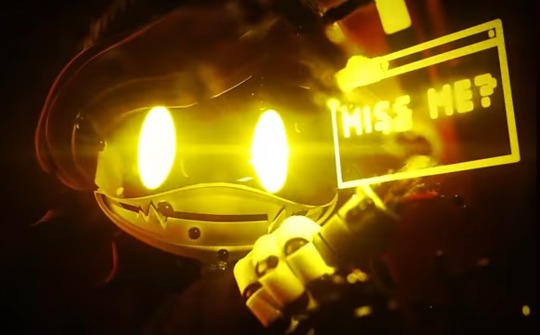
Yeah okay that's a pretty terrifying thing to see, and I can pretty logically assume this is hallucination on N's part, but does that stop him from literally CATCHING HER IN THE NEXT THREE SECONDS???
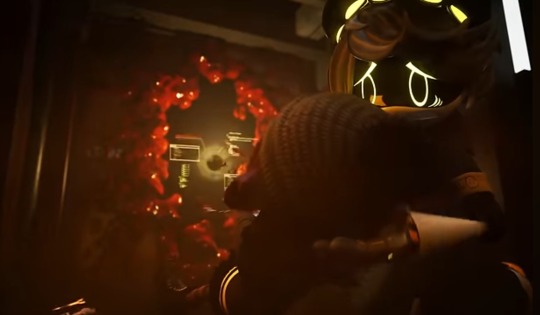
NO THE FUCK IT DOES NOT LOOK AT HIS HAND LOOK AT HIS HAND UNDERNEATH HER HEAD LOOK AT IT
CAN WE ALSO TALK ABOUT THE CHANGE IN EXPRESSION THAT I CAN ONLY ASSUME IS DUE TO WHAT HE SAW?? Like also I assume yeah obviously he's worried about Uzi because who the fuck wouldn't be (Cyn) but like LOOK AT THIS BULLSHIT
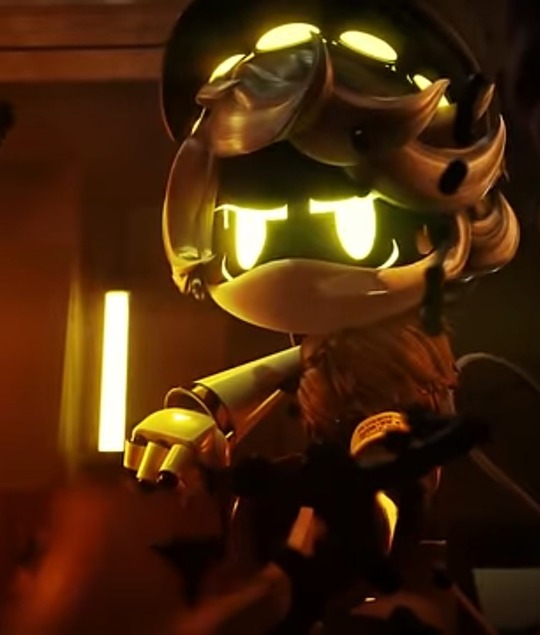
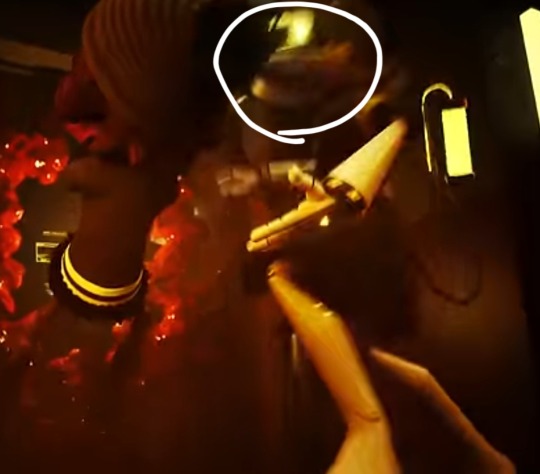
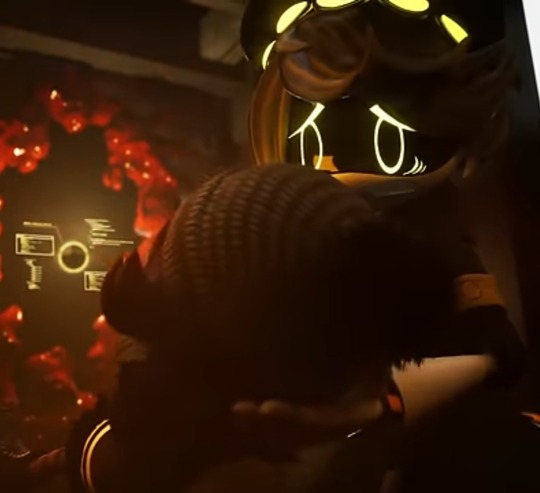
HIS EYES DON'T HOLLOW OUT UNTIL SHE NEARLY HITS THE GROUND AFTER THAT WHOLE THING OCCURS AND YOU CAN SEE THE FUCKING SWITCH FROM "Oh my fucking god what the hell is happening" TO "BEEP BEEP BEEP RED ALERT SHIT'S GOING DOWN OH BISCUITS OH FUCK"
"Myrah what the fuck are you on about it's 8:30 in the damn morning?"
I AM UNWELL ABOUT THESE TWO GODDAMNIT
#AND I GIVE 0 FUCKS ABOUT WHO KNOWS#OR WHAT THE FUCK TIME IT IS#GOD THESE TWO MAKE ME SICK THEY MAKE ME ILL /POS#I need to write a very very long post about them very soon#another thing to add to the list of long ass posts I have to make... sigh...#yeah J enjoyers I'm coming for your ass#I have an analysis to perform and no I will NOT wait for permission#and FUCK YOU for expecting me to#(i know no one was expecting me to)#anyway#murder drones#md#glitch productions#glitch#uzi doorman#serial designation n#nuzi#biscuit bites#n x uzi#uzi x n#mymy rambles
196 notes
·
View notes
Text
I'm once again getting overly philosophical over horror movies, so here's a study of the death angels from A Quiet Place as observed by a very enthusiastic animal loving veterinarian.
Every time people talk about death angels, it is, understandably, about how violent they are. These creatures are brutal and merciless, and will tear apart anything that makes too much noise. Hence the title of the movie.

Death angels are frankly terrifying, and show no empathy towards the creatures of the planet they invaded. No living thing is safe from them.
... so here's why they COULD be--
Look. Death angels are simply not suited for our planet. It's a noisy, chaotic place full of noisy, chaotic animals. From humans, to raccoons, to birds, to cats, nearly everything in our world is a potential trigger for a noise sensitive animal such as these.
But that's exactly what they are. Animals. And no one seems to remember that fact. People talk about them as though they themselves are sentient, anthropomorphic monsters, but the way these creatures act mimic many real life animals. Animals that don't belong here, but are trying to survive here. On a noisy planet covered in water, which they despise and cannot swim in.
Death angels are completely blind by nature, as seen in many other creatures such as cavefish, moles, and my personal favourite, the olm. Due to a lack of sight, they very clearly use echolocation in the film, to scan their surroundings and... well, not get dead. But echolocation is far from their only tool, as their ears are the strongest asset they have.
Their ears are INCREDIBLY sensitive. Just the slight ticking of an egg timer when heard from their perspective in the first film, is like a pounding drum in their ear. This is fine in a naturally quiet planet, but if a very subtle tick is that loud, then imagine the rest of the noise. Screaming. Explosions. Crashing. Little toy planes. Holy CRAP, that's gotta hurt.
Sounds that loud would definitely cause extreme hearing problems from pressure over time, and easily result in lifelong illnesses and disabilities such as deafness, infection, and so forth, if not stopped. It's going to be painful. It's literally bursting their ear drums inside their heads, and you can't explain to an animal why it hurts. You cannot rationalise with wildlife about treatment and self care. An injured and scared animal is always going to turn hostile, no matter how docile they may be normally. You can't explain to a lion with a knife in it's belly that you can stop the pain if it just doesn't attack you. You can't explain to a death angel that it needs to go somewhere more isolated instead of just destroying the source of the noise to shut it up.

Going to backtrack here a sec. Remember how I mentioned echolocation being another asset this creature has? Which means the slightest movement, the tiniest breath, can immediately allow you to be seen by it. With ears that good, too? It can see you from ages away. It knows you're there. Which means they DON'T attack for sport.
'Evil' is a concept rarely seen in nature. Yes, a lot of humans can be evil. And yes, many creatures can be too. Animals hunt for sport as well. Cats, for example! Although even then, I wouldn't describe it as evil. Calling the death angels evil implies they're attacking out of malicious intent, which just isn't true. In moments of panic, they'll destroy. But they are fully aware of humans around them.
Humans need to breathe, and can't stay perfectly still very easily. The death angels would be able to see our main cast at several points, even when they're being quiet. They don't attack whenever they locate a sign of life. For example, the scene in the basement. Being that close, whether the water was running or not, that alien absolutely would've heard Evelyn and the baby's sharp breaths. It didn't care. It was clicking at them almost curiously before it heard the bang of the silo, to which it ditched them to stop the sound.
This scene is a great example of why they don't kill for sport. Injured and young animals are especially easy prey for a creature built so strong and nimble. Evelyn is shown to be terrified of the mere presence of this thing, but it never actually does anything in the scene. It moves about. Ignores her movements in the flooding water. Investigates the baby. Clicks curiously at her while she backs away. It moves slowly and on all fours, when we know while aggressive, they will stand up on their hind legs (unless sprinting) and move very fast.
This implies it was in... well, not a submissive position, but a nonthreatening one. It wasn't baring it's teeth (as best it could), it had it's claws tucked up and unused, and was in no way in a primed-to-attack mentality. Until the silo made a loud bang. And even then, it could've quickly sliced up the two in the basement before running off, but it DIDN'T. It just left, without a moment of hesitation.
Let's also acknowledge the anatomy.
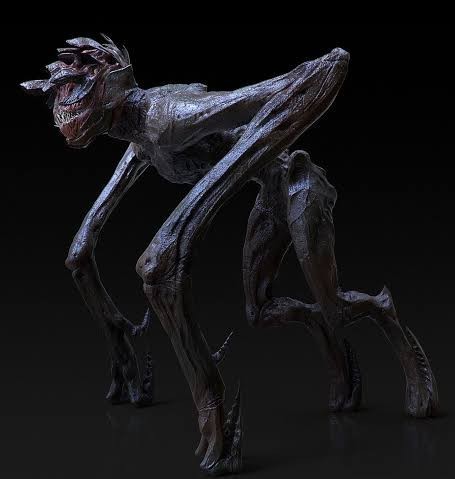
This is a carnivore. With sharp teeth for ripping apart prey, sharp claws for defence, and thick armour for protection from it's natural climate, as well as strong, long legs for running, this is absolutely a meat eater. The fact it's so well equipped makes me wonder if their natural prey is just as dangerous as them, which is why they have such tough skin. Or if they themselves have something above them in the food chain.
They seem to be pack animals, as usually others aren't far behind when one is about. Such as the trio by the Abbott house, the few at the docks, the ones by Emet's hideout, and even that group sliding down the building in the Day One clip I keep seeing as a gif. With their knack for running included, I wonder if they function like lions? Blending into their environment back home, clicking to hear prey, then the whole pack going on the chase when their target is vulnerable, in a way.
I got distracted. My point was, in a year, all the bodies from past victims vanished. All those people in the town who were swiped left and right just vanished from the town. They couldn't have decomposed in such short time, which means something moved them when it was safe. Something like a carnivore needing food after it felt comfortable in the silent aftermath. The argument that they do it for sport is one I see all the time, and it's just not true.
Everything needs to eat. Carnivores need to eat. Animals need to protect themselves from suspected danger. They never eat on screen because whenever they're on screen, they're surrounded by noise and are DISTRESSED. Have you ever had a sick pet? Most of the time, it won't eat when it's ill because it's too stressed, uncomfortable or in too much pain. When having their ear drums assaulted, a death angel isn't going to sit down with a cup of tea and a grilled cheese. Also, I won't add it because there's blood, but in the scene with the old man screaming in the woods, after it attacks, you can actually see it go back on all fours and sniff about the aftermath, like a hungry predator catching prey to eat. This was probably the first and currently only on screen proof of my claim.
By all means, not all animals are meant to be tamed. Jordan Peele's Nope said that best. Yet I can't help but wonder about the individual. Every animal is completely unique. Some will tolerate more than others. Due to their realistic nature and the similarities to actual animals, in specific circumstances, could they be befriended?
Anyway keep an eye out for A Quiet Place 4 where someone has a pet one that wears doggy ear protectors and accepts meat in exchange for pets-- /j
#this is a very roundabout way of saying I want to pet the lizard cats#they can purr they are CATS#.../hj#anyway I do genuinely find them very interesting to study as if they were real creatures#I hope we get more insight into them in Day One#especially considering it adds Frodo to the mix#so we'd already be studying one species' adaption to their being on earth#the opportunity to compare natures is RIGHT THERE#I'm hoping 🤞#a quiet place#a quiet place part ii#a quiet place day one#death angel#death angels#long post#zoology#I guess#maybe#let me have this I'm an animal nerd AND a horror nerd#tw gif warning#tw horror#analysis
494 notes
·
View notes
Text
Something I deeply enjoy is how many times Alucard is positioned by the moon, either in a cool dynamic way or because its simply night time when hes doing stuff










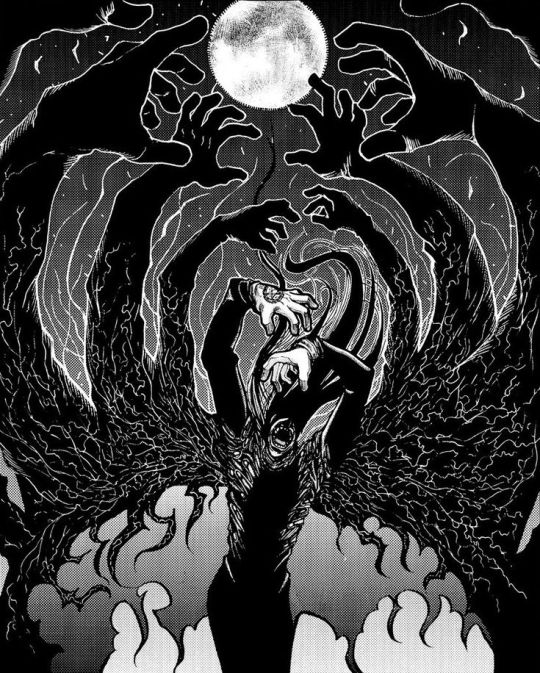
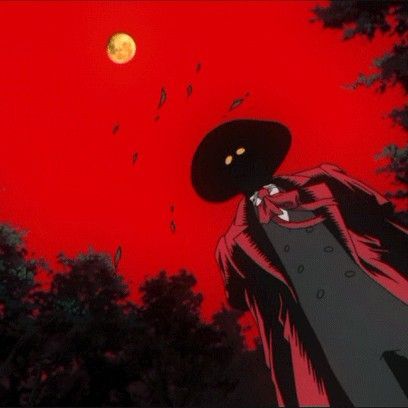
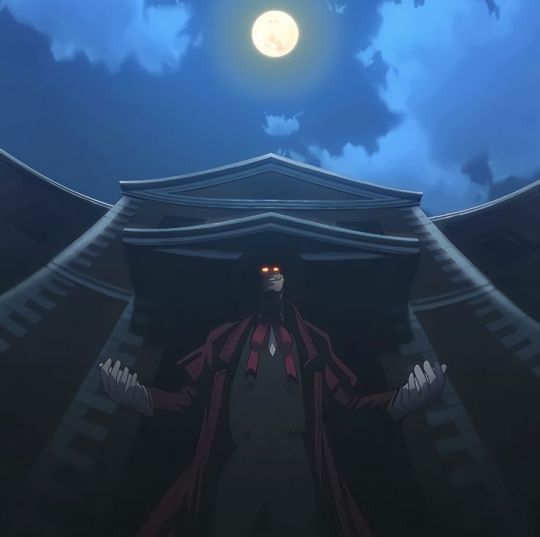
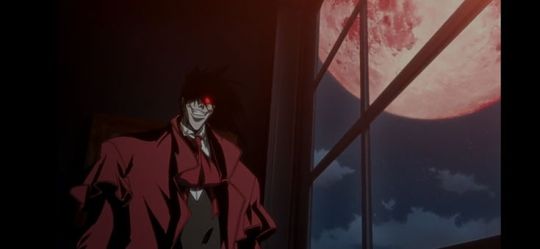
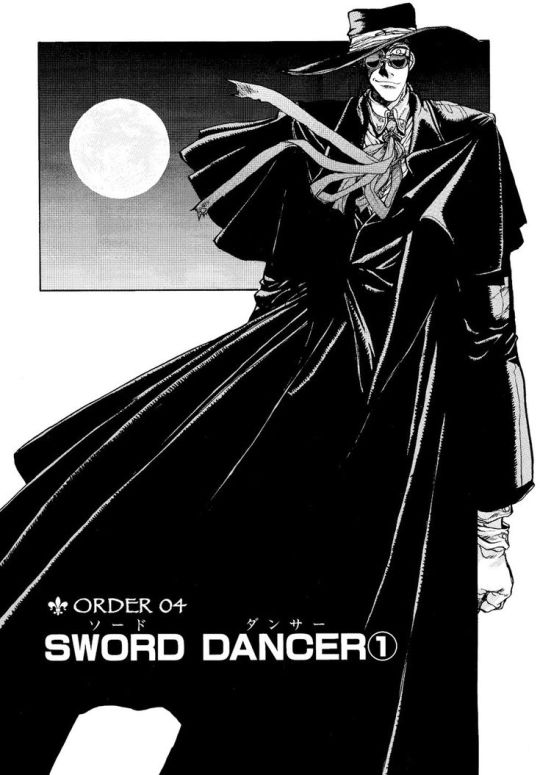
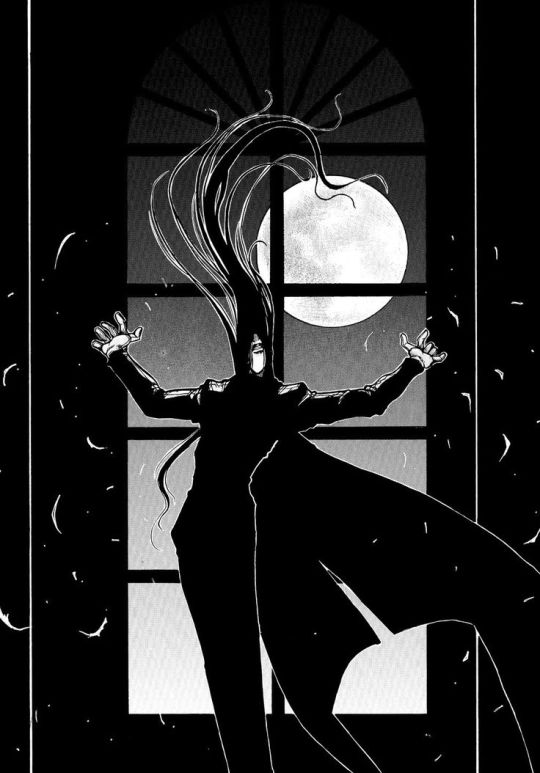
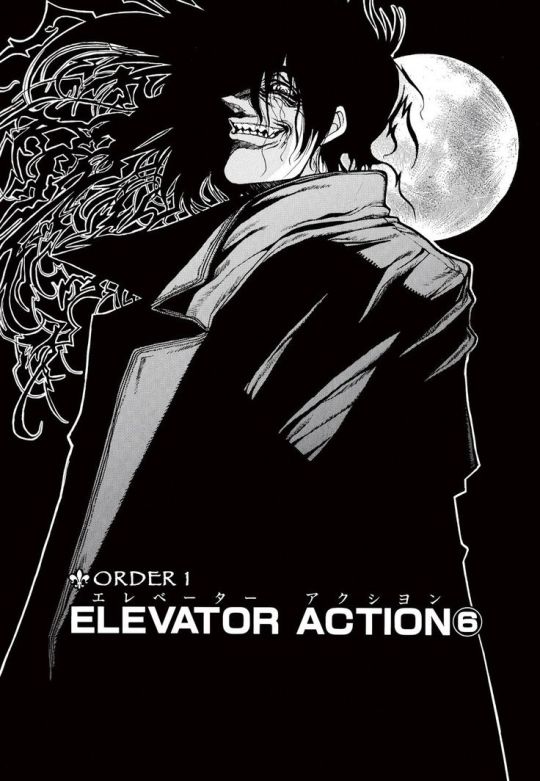
theres def more but these are just some (a lot) of my favs + what I could find
#thank you hellsing wiki and pinterest#i didnt feel like going through my manga for panels and covers#theres probably some cool analysis that can be made about this or its just a tie into the fact that he gets stronger under a full moon#the fact its a full moon that long is kinda weird tho#idk i have a very deep connection with the moon and she is a mother to me so i get very happy when i see her in panels like this lol#hellsing#hellsing ultimate#rambles#alucard#moon#hellsing gonzo#hellsing manga
305 notes
·
View notes
Text
One Piece means a lot to me as a disabled person, which I think would be pretty surprising to anyone who only has a surface understanding of it. The supposed central theme of "follow your dreams" would be pretty alienating to someone like me, right? It really, really would be, if that's what it was actually about.
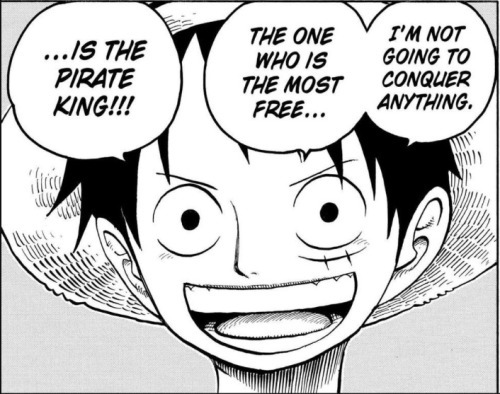
However, that ignores that Luffy's dream is to be the most free person in the world. And to attain that goal, the first thing he does is find friends to live life with. Over and over again, from the very beginning, he takes on their burdens, all in the name of being the most free.
Do you see what that would mean to me, as someone who needs more help to get by than is considered culturally normal, to the point that it puts me in a whole socially manufactured category of "other"? Not to mention, because of the infantilization of me due to that category, because of being forced so squarely into the "cared for" role, taking care of other people is deeply meaningful and empowering for me. However, the myths of independence and universal natural ability often make it emotionally difficult for my loved ones to accept that care.
The fear of asking for help, the guilt of being cared for, the weight of someone you loved who could not be as free as you, the insecurity of not contributing enough, the fear that you were born wrong, the self-hatred that says you are not worth the effort, Nami Sanji Zoro Usopp Robin Chopper Ace they all explore the painful obstacles to free connection. Through deeply impactful stories that weave beautifully into the larger one.
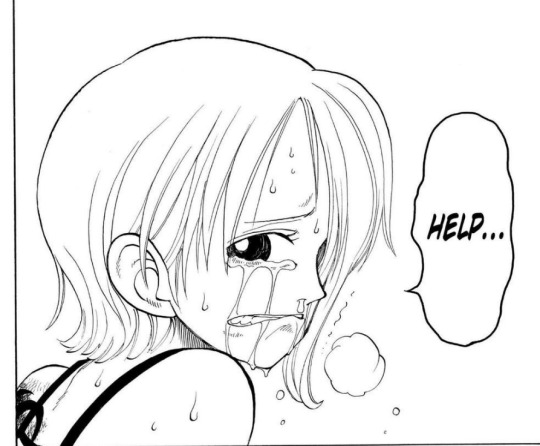
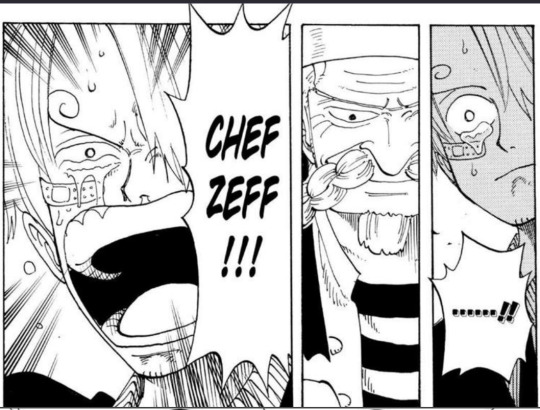
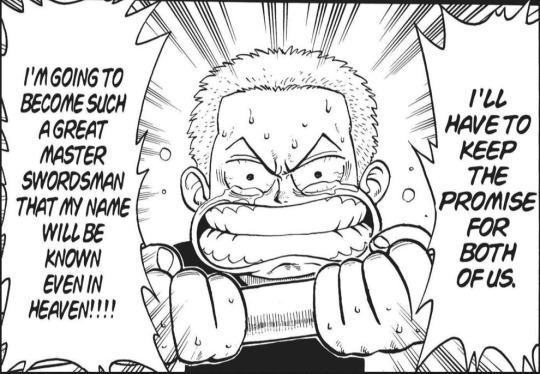
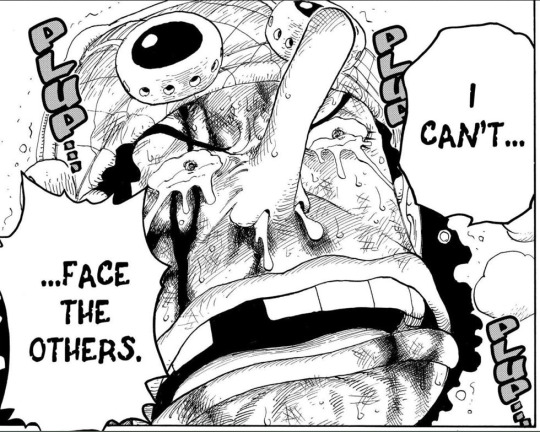
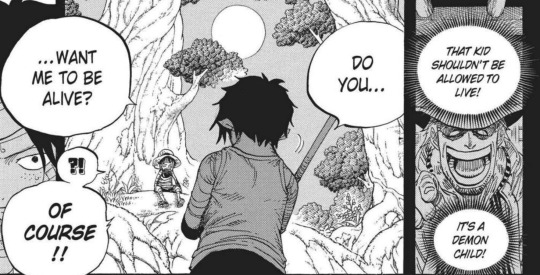
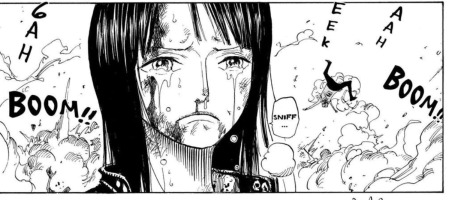
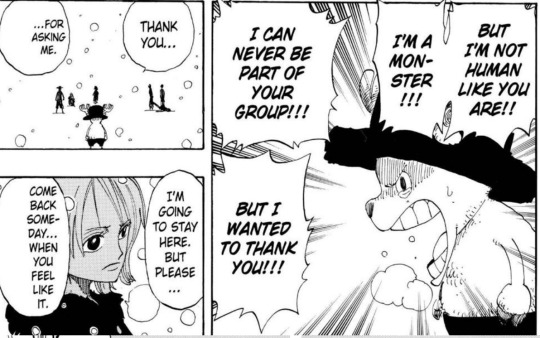
All centered around this one person who views loving them and living with them and carrying them as essential to his freedom. Who cannot, for countless reasons, live a normalized life of Structured Relations. Who views exploring and bickering and suffering and laughing with them as the ideal way to live. Who repeatedly puts his life and limbs on the line to do so.
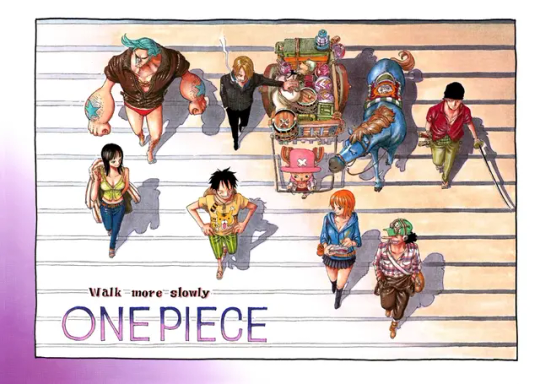
To me, it is an ultimate privilege and freedom to carry other people's burdens. To care for them and live with them. This is central to my whole perspective, and is completely informed by my life experience as a disabled person. I rarely see it reflected back to me. Let alone as powerfully and beautifully as Luffy does.
Nor the other half of it, of wanting to create this life with people in ways that aren't socially normal or approved. Of creating many varied lifelong intimate relations among equals, rather than conforming to the expectation of choosing One Person to live life with and then Creating More.
The utter lack of roles and norms is just as integral and powerful to the exploration of freedom and connection! It is meaningful to me as a queer person, yes, but even this is deeply influenced by my disability. I could never be that One Person, despite everything I have to offer, there is logistically far too much that I cannot do to be someone's equal partner in this society that demands so much from all of us. However, even if I could, I wouldn't want to! It doesn't make any sense to me to only have two people navigate life together on such intimate terms. Can't the demands of society be more comfortably met in a group? Isn't life more fun that way?
We are taught that we can and must do everything ourselves, I just happen to be one of the people that never had a chance to buy into that lie. To learn very early not just the necessity of interdependence, but the joy in it. To learn that it is most comfortably lived with more people involved. To me, close relationships are, love is, a natural extension of that understanding. One Piece celebrates interdependence constantly from the start, while never pretending that it is always easy.
The obstacles to free connection that I mentioned before, they are interspersed throughout the story, and they are always met with "I do the things you can't do, and you do the things I can't do." With, "Of course I can't use swords you dumbass! And I can't cook either! I don't know a damn thing about navigation! And I can't lie!"
These are intentionally impactful moments, and they define the series. I found it very fitting that the Fan Letter focused on a character who was empowered by Nami to feel free and live adventurously despite not being the most physically capable. The character is able by our definition, but the story is very affirming in a disability way, and it was extremely One Piece. I loved how it acknowledged this deep connection between One Piece and the lived reality of disability and celebrated it as integral as it is.
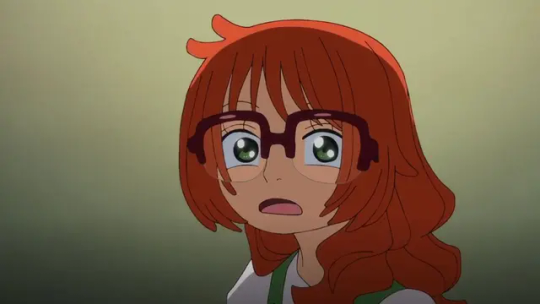
I also believe that absolutely none of this is intentional. It is simply an earnest exploration of human relationships, emotions, and behavior, and it naturally arrives at a radical and disability-affirming viewpoint. Because we are the monkey wrench in the deeply unhealthy (lol) and dominant line of thinking that independence is all. So naturally anything that also disputes that thinking has a disabled-perspective feel to it. The best part is how much it doesn't give a fuck! One Piece is aggressively against conformity in human relationships, in a way that is hard to find in our new world of self-conscious authors.
It's also, you know, the worst part, in terms of all the outrageous bigotry and offensive character design, but god damn it if it doesn't elevate the good parts to unbearable heights. Even the bad character designs can sometimes be more impactful for their intentional "ugliness", when those characters are inevitably taken seriously despite their appearance and the stereotypes they play on, it hits hard every time. I do have a simple hatred for many choices, there is no pay-off for much of the awful problems in numerous character designs and dialogue. But no matter how upset I can be by those things, in the end they can't succeed in pulling me away from One Piece. It's just so crazy and unique and great and terrible and beautiful and I LOVE IT.
#WOOF. FINALLY FINISHED THIS POST.#I am basically always trying to articulate this. I've written so many long posts.#but fan letter got me to give it my best effort once more. ITS SO GOOD!!! YES THAT'S WHAT IT'S ALL ABOUT!!!!#i love especially the meaning of it being USOPP who finds mimi (my headcanon name for nami's fangirl) and gives her directions.#he who most recently and directly struggled with his lack of ability. she doesn't even know about that.... ough....#YOU DON'T HAVE TO BE THE MOST CAPABLE TO GO ON ADVENTURES!!!!!!!!!!! GO MIMI!!!!!!!!!!!!!!!#my posts#one piece#op fan letter#opfl#one piece meta#op meta#one piece analysis#op analysis#i guess lol i hope this reaches some people despite you know. being. how i am.#(intense and clearly having gotten very deep into my particular perspective after endless verbalizing)
201 notes
·
View notes
Text
Charles, within a few hours of meeting Edwin: I'd love to move in with you and start a business together

Charles, within a few hours of meeting Crystal: Hi! Would you like to see my parents?

Charles, love, I'm begging you to slow down
You absolute u-hauling lesbian
#bisexual#charles rowland#crystal palace#edwin payne#cryland#rowlance#crystal x charles#charles x crystal#payneland#paineland#painland#paynland#edwin x charles#charles x edwin#parallels#character analysis#uhaul lesbian#queer culture#i guess#text post#liveblogging#dbda#dead boy detectives#dead boy detective agency#the case of crystal palace#the case of the very long stairway
659 notes
·
View notes
Note
Hello! I just saw your latest post and you might have been referring to my ask if it was the one about Ratiorine's differing philosophies or of what philosophies they abide by (existentialism, absurdism, etc) then that's me! If you weren't referring to that I apologize for the confusion. Sending it off anon this time so maybe it doesn't disappear 🥲
Sorry for the ask disappearing the first time; I'm not sure what happened, and I was so sad because I had been carefully holding on to it to answer it! I'm glad you were able to resend.
I do have to say first that philosophy is not my area of expertise, so there may be much more qualified philosophy buffs out there who can answer this more accurately than me, but I'll give it a go with my personal understandings of the characters:
First, Ratio is the easier of the two I think. As many people have said, he's a good fit for existentialism. His entire shtick is basically believing in the power of the individual to improve and enrich their own life, to fight valiantly regardless of the hardships imposed by their life's circumstances, and to make themself into a better person by their own choices.

It's important to underscore that this means Ratio believes in self-determination, in the idea that people's lives are not foreordained but are actually actively shaped each day by personal decisions. Therefore, people have inherent freedom to decide the course of their own lives by accepting what they approve of, refusing to accept what they disapprove of, and harnessing their own individual power to ultimately achieve self-actualization.

Essentially, Ratio works under the impression that life is not guided by something as intangible as destiny, and no matter where you start off in life, what ultimately happens to you is within your control (or at least within the control of whoever controls you). This is likely a small part of why it grates on him so badly that he wasn't recognized by Nous, because the fact that one can dedicate everything to a goal and still not achieve that goal runs contrary to his central philosophy.
If he believes that people have the power to determine the course of their own lives, then what does it say about him, who fought so hard to do exactly as he claims even idiots can do--seize control his own fate--and yet didn't succeed? Are there some things outside of man's power? It's enough to make even a renowned doctor question himself, and Ratio decided to come out on the side of "It's a personal failing, not a flaw in my philosophy." He literally said "Skill issue" to himself.

Changing tack a tiny bit here, I think it's also important to emphasize that there is a difference between existentialism and nihilism even though these philosophies dovetail. Again, I'm not an expert in philosophy, so my understanding is very limited, but the basic idea of existentialism is that "existence comes before essence"--that is, things start as a blank slate and gain nature and meaning after the fact. We are not created by some grand design, nor is there any inherent "purpose for living." Things just exist because they exist.
This is where existentialism intersects with nihilism, at the starting point that existence is inherently meaningless. But, in my personal opinion, nihilism as a philosophy fails to move beyond that. Pure nihilism is ultimately self-defeating because it leaves us with no motivation to commit to growth. It's a philosophy antithetical to the continuation of life as we know it. Existence is meaningless and any meaning you personally derive from existence is also meaningless, so why bother attempting to derive any meaning at all? This complete apathy is the Device IX that Star Rail paints as so dangerous.

And Ratio is not this way at all. His philosophy absolutely reaffirms that life can have meaning, so long as people create that meaning for themselves. He simultaneously asserts that anything that people create is not meaningless ...which basically means that meaning itself cannot be meaningless. (If that makes any sense to anyone.)
Frankly, I would argue that this philosophy may be a core part of why Ratio has not been recognized by Nous so far, rather than simply his "being a good person." (Nous is a robotic AI super-computer, why would THEY care about the presence or lack of human empathy?) Ultimately, Ratio's central philosophy about people being capable of determining their own fates and purposes also applies to his understanding of knowledge--knowledge is not something which is inherent in certain beings from birth or limited to the purview of the "special" (geniuses), but is attainable by all people. People are not "born talented" or "born untalented," they are simply "educated" or "uneducated," with the only barrier between these categories being one's own personal willingness to change. The mundane can become the divine--if they work hard enough at it.

Thus, knowledge is not wealth to be hoarded, but a currency to be spent to enrich other members of humanity.
(By the way, completely random aside--it also surprises me that everyone relates Ratio to Alhaitham from Genshin when they literally have such a glaring fundamental discrepancy in their understanding of the concept of wisdom... But anyway, back on topic!)
Ratio may (sort of) respect the members of the Genius Society, may recognize their incredible knowledge and abilities, but at the heart of the matter lies a single all-important question: Does Ratio even really believe in "genius" as a distinction (other than as a concept to insult himself)? Does he truly believe there is barrier between brilliance and idiocy that "ordinary people" can never cross?

He speaks convincingly about geniuses being different from "the ordinary," but if his core belief is that people have the power to pull themselves up out of despair and achieve greatness through effort and self-development, rather than some form of luck or god-given talent at birth, then... do born "geniuses" even really exist? Is there really an insurmountable difference between brilliant and mundane?
If knowledge is the equalizer of all sentient beings, do we not all have at least the initial capacity to become geniuses?
I personally think this central distinction about the capacity for knowledge among all humanity is the actual deciding factor in Ratio's rejection from the Genius Society, because, at the end of the day... how do you become a member of the "Genius Society" when you fundamentally reject the distinction of "genius" as an exclusive category from the start?

Ratio wants to share knowledge and uplift everyone (even if he thinks most people are starting off at the rock bottom known as idiocy).
His mission is diametrically opposed to the concept of a "Genius Society" in the first place.
He wanted in to the cool kids club because he desperately craves validation and acceptance, but the philosophical values of the Genius Society are ultimately incompatible with his own. In short, he would have to cease to be "Veritas Ratio" to succeed in joining the geniuses.
Okay, okay, back to the original point again, and just one more note about Ratio: Even though existentialism also goes hand-in-hand with absurdism, I don't think Ratio is far enough down the philosophical rabbit hole to believe in the wider definition of absurdism. Although I think he does agree with the inherent meaninglessness of existence, I don't think he views existence itself as truly irrational and the universe as as manifestation of unknowable chaos. I think he'd at least like to imagine that there are some ontological principles and inherent laws governing the operations of reality, and I think he does believe that certain things can be predicted with the application of enough thought... He certainly seems to believe in some form of "objective truth," at the very least.

I think he'd at least like to believe the universe is semi-orderly, even if he might deep down admit this is also wishful thinking.
So, to me he reads as a strong metaphor for pure existentialism, with deliberate rejections to both nihilism's apathy and absurdism's lean toward solely subjective reality.
PHEW, this is already long and I still have a whole other character to talk about... I had more to say about this topic than I thought. Sorry for the long read!
Anyway... Aventurine.

I've seen all sorts of things thrown around for Aventurine's philosophy, and while I think he does inherit a bit of Acheron's absurdism by the end of 2.1, I actually don't think Aventurine is an absurdist, an existentialist, or a nihilist.

I think Aventurine is a struggling fatalist.
He doesn't like it. We see him actively question it, but ultimately, he does come back to the concept of destiny over and over.

First, I think it's important to draw a clear distinction between Ratio and Aventurine: Ratio's existentialism is a philosophy that technically works even in a theological vacuum. Nous doesn't have to exist for Ratio's philosophy to function. Ratio's belief in the self-determination of humanity is, in fact, somewhat opposed to belief in aeons in the first place, and only works because technically the aeons of Star Rail used to be human (or were originally human creations). It's essentially an atheist viewpoint.
But Aventurine is a religious character. Like, he's just... religious. That's a fact about him. Even though we do hear his doubts, at the end of the day, he actually believes in Gaiathra, and believing in a omniscient supernatural being that is not human in origin (is from outside the aeon system) comes with a whole set of philosophical foundations that most aeon-worshipping characters just don't have in Star Rail. (Sunday is the obvious exception here, by the way.)

Kakavasha's like the one practicing pagan in the middle of an atheist convention. Awkward.
Being more serious: Religion requires faith. Faith requires the ability to believe in things you cannot verify with empirical facts. To believe in things you can only feel, never see. The belief that a goddess is watching over you, blessing you, and guiding you requires you to also accept the idea that events in your life are not always in your own control--that some of what occurs to you is decided by powers beyond your comprehension.
In essence, faith requires belief in fate. And that leads to fatalism.


No matter how much he doesn't like it, no matter how much we see him struggle with it, Aventurine does actually seem to believe in the concept of fate. He believes that some events in life are destined to occur, that some things are outside of individuals' control, and that ultimately not everything can be changed.
This is the dead opposite of Ratio's mindset: No matter how hard we fight, how far we push ourselves... in the end, sometimes people fail. Sometimes the only answer to our endless struggles is that we die, as we were destined to, before ever achieving the greatness we sought or the futures we were promised.

As an aside, I don't think faith or religion are necessarily the only factors connecting Aventurine to this particular philosophy either. Even removing theological aspects from the conversation, his extreme focus on the gambling aesthetic suggests a strong connection to fatalism too--if not a goddess, then one's fate may as well be in the hands of luck itself, of the whims of the rolling dice--or the push and pull of "powers that be," those figures of authority in the room where it happens, who make their shady deals according to preset rules and expectations, every bet resulting in an ultimately predictable outcome.
(He keeps gambling and gambling, hoping that he'll get a different result than the one he knows is inevitable...)
This is, of course, an inherently pessimistic mindset, a perfect dark-mirror to Ratio's deep-down optimism. Fatalism puts humanity into a position of powerlessness. All hopes and dreams are given over to the goddess, by whose judgment and whims the actual events of one's life are decided. Pain and poverty are inevitable trials. Suffering and death are foreordained.

And yet Aventurine has to cling to this, as much as he doubts it, as much as he hates the idea that things in his life are beyond his power to control.
Because if fate doesn't exist... If it wasn't destiny, if the tragedies of his life weren't trials from the goddess, if things weren't supposed to go this way... Then every single thing in his life really is meaningless. Everything he suffered, everyone he loved and loss, his mother's and sister's sacrifices, the torment he went through--just sheer bad luck. All of it, completely and utterly meaningless.


How can you convince yourself to keep living, in the face of such supreme and all-encompassing Nihility?
This is the central struggle of Aventurine's character, the actual mental and emotional journey we see him undertaking from 2.0 to 2.1. He is literally on the precipice, swinging between a viewpoint that he hates--his fatalistic belief in destiny--and an entirely self-defeating philosophy--nihilism--whose only possible final outcome is suicide.

This is what his talk with Acheron at the end of 2.1 is all about. This is how she saves him. In that final cutscene, we witness Aventurine reach a mental compromise, managing to finally reconcile his necessary faith in the concept of destiny with the reality that life may truly begin meaningless--but beginning meaningless does not mean staying meaningless, and believing in destiny does not bar you from making your own choices or finding your own purpose in life.
Later on in Penacony's story, we literally see Acheron use Ratio's philosophy to reject the same nihility that crept into Aventurine's:


Acheron wards off nihility's apathy through an absurdism all her own, but one which manages to enclose both Ratio's and Aventurine's otherwise incompatible mindsets: We have no way of ever knowing for certain whether the events of our lives are fated or mere nonsense. We have no way of knowing if our choices are our own or foreordained. But we don't need to know this to find meaning and value in them. Whether life is nothing more than unpredictable chaos or a predetermined pattern of cause and effect, what matters is what you make of it.

Ultimately, I think that this post has really helped me recognize just how well Aventurine and Ratio work as philosophical foils.
They really are perfect opposites.
Aventurine's fatalism is deterministic, while Ratio's existentialism is self-deterministic. Aventurine's philosophy is inherently pessimistic; Ratio's is inherently optimistic. Ratio's philosophy operates on a core belief in the freedom of humanity to decide their own paths in life, while Aventurine hates but does ultimately believe that people aren't really in control, that even if no gods are guiding us, we can't rise above our own natures. Ratio's philosophy makes meaning from growth; Aventurine's makes meaning from loss...
And they both struggle with fundamental doubts in their own philosophies, core questions that are directly tied to their own lives. Aventurine worries that his faith might be misplaced, that destiny might not exist, and that everything he suffered might have been in pointless, empty vain. Ratio faces the crisis of recognizing that his core belief in the power of humankind to determine their own paths and make their own meaning might not actually apply to everyone--because it doesn't seem to apply to himself.

It's literally only by bridging this philosophical binary with Acheron's anti-Nihility absurdist rhetoric that we can reach some sort of healthy outcome. That's why it takes both Ratio's note and Acheron's comments to finally lead Aventurine to acceptance. Ratio probably needs a little bit of Aventurine's "If you didn't make it into the Genius Society, there's got to be a reason" mindset to finally reach some peace with his situation too.
I'm not even a philosophy expert and even I can see that there's really only one takeaway here: These two characters were totally written with each other in mind.
Aventurine and Ratio need each other on core metaphysical levels! 😂

It's so good guys. You can't see it, but I'm making chef's kisses, I promise.
#honkai star rail#aventurine#dr. ratio#ratiorine#aventio#well the implication is there at least#character analysis#honkai star rail meta#philosophy#long post is long#this took so long oops I'm posting at 2am#entirely unrelated but innenofutari#you are very based for having a Princess Tutu quote in your bio#that's the most important thing I could tag this post with#actually#also if my philosophy understanding is all wrong I'm sorry#not gonna lie I dated a philosophy major in college soooo#that should tell you everything you need to know about my feelings toward philosophy
221 notes
·
View notes
Text

So after the spoilers for Chap 257 dropped, I saw some tweets clarifying the meaning of the Kanji Sukuna used in the chapter when referring to his mother, and the overall reveals in the chapter got me thinking.
I’m making this post as a way of gathering my thoughts, personal speculations and where I think all of this connects to Sukuna’s character and the information Gege has given us over the years. Nothing I say is by any means new information, but like I said, I’m just collecting my thoughts here. By the way, just a warning, this post contains SPOILERS for the JJK Manga! If you don’t like that, please don’t read this!
Something I’ve noticed is that the theme of “Hunger” and symbolism of “Cooking/Food” is heavily referenced with Sukuna throughout the Manga. Gege in a previous Fanbook has disclosed Sukuna’s favorite Hobby to be “Eating”.

This theme is again very much ingrained within Sukuna’s cursed techniques and even his Domain Expansion, the “Malevolent Shrine”. With his two main techniques being “Dismantle” and “Cleave” are cutting-type attacks. He is also able to use a Flame-Arrow, and Fire is essential for making Food. The Shrine in his Domain Expansion literally has mouths on all sides, looking eager to chew down anything in-front of them!
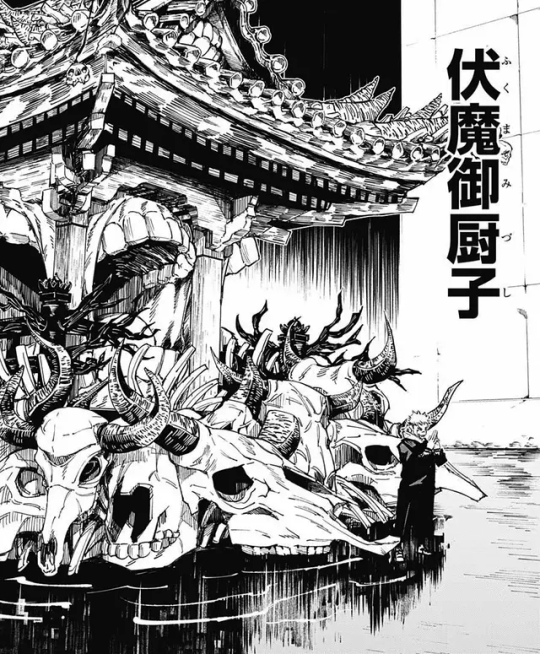
This symbolism also heavily influences Sukuna’s own manner of speech, and the way he speaks to other characters in the series as well. With his post-fight chat with Jogo before his death, Sukuna mentions Jogo lacking the “Hunger” to take control of his desires, preventing him from reaching the heights of Gojo Satoru. Before the Start of their fight in Shinjuku, Sukuna called Gojo a “Nameless Fish on top of his cutting board”, and that he was going to start by “Peeling off the scales”(refering to Gojo’s infinity). There’s also further symbolism that supports this by analyzing the Kanji and meaning of Sukuna’s “Malevolent Shrine” but I’m not very educated on that so I won’t be opening that point here.
What all of this points to is that Eating and Food……is extremely important to Sukuna, to the point that it literally affects him in manners innumerable.
Eating is an instinct, a necessity for the survival of every single living being.
And In the face of extreme Hunger and starvation, even those with the strongest will could lose their Humanity and revert to the basic animalistic side of their existence. (The Heian Period also had a Famine, although I believe the timing to be a bit off, but do with this info as you see fit)
In JJK Chapter 257, it is revealed to us that Sukuna and his Twin were most likely starving in the womb of their starving mother.
On the brink of starvation, Sukuna had to consume his “other self”(his twin), so that he could survive.
Btw, this tweet and this thread gives additional characterisation to Sukuna:

Link to the original thread: Link.
More context (and reactions :P):

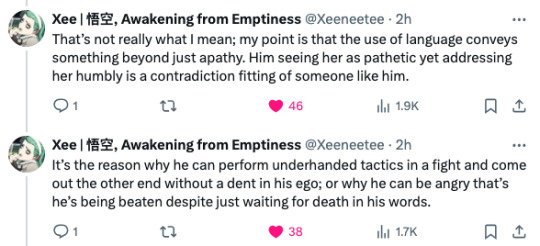
Link to original thread: Here
This reveals to us that indeed, Sukuna was born a twin. And as we all know, “Twins” are seen with extreme scrutiny in Jujutsu Society, they’re not well liked. This too in a period where Cursed Spirits and Jujutsu Sorcery was at its peak, it is not far-fetched to assume that his Mother may not have been treated very well by the people in her surroundings, especially as she bore twins.
When Kashimo asks if Sukuna was born the Strongest or if he made himself the Strongest, this is the response Sukuna gave to him:

When you think about it, how do you think the people around them would have reacted when the woman: who was supposed to birth two twins, gave birth to a single child instead? and that child had consumed his other twin in the womb itself?
No doubt people would’ve been horrified, disgusted and even revulsed. With the woman and her newborn child.
This would’ve led to their further ostracisation in the already very close-minded society. Unable to fend for herself and her newborn child, it must’ve been difficult for Sukuna’s mother to survive. I feel like somewhere along the line, Sukuna was left alone to fend for himself at an extremely young age. To protect himself from both Curses and Society alike.
This is why I believe Sukuna knows what true starvation, weakness and hunger feels like. Both in the emotional and literal sense. He was left without another person caring about him or his well-being, in a cut-throat period where it was “Fight or be killed”.
Powerful curses roamed all across Japan, nowhere was safe. Simply be strong, or you'll die. There's no room for weakness. And initially, a kid!Sukuna was weak, as anyone would be in the beginning when they're just starting out in this world. (and maybe, he didn't have much to eat, leading to long periods of starvation? :') )
I believe it is this debilitating hunger, and feeling of weakness that eventually led to Sukuna’s current Hedonistic mindset.
He’s essentially traumatised by it, and believes that it was his own weakness that led him to experience this sheer starvation. That he deserved to feel this way because he was weak then. Perhaps, the people around him were right, that as long as they have the power and strength to overcome anything, they’re free to do as they please; And there is nothing anyone else could do about it.


I feel like the irony here is that Sukuna himself, must’ve been a “weakling” before eventually rising the ranks to become History’s Strongest Sorcerer. This is also why he values Strength so much.
Ultimately, Sukuna has decided that there was nothing more important than being strong enough to fulfill your own desires. And “eating” is one of his most important desires. It’s his favourite thing to do, the one he derives the most pleasure out of. And like an animal, whose main focus is to consume, consume and consume. He too, simply consumes.
Most morals likely have no meaning to him. He doesn’t care who he hurts, what he does, as long as he’s able to get what he wants. And this isn’t limited to eating.
This is why people referring to Sukuna as a “Natural Disaster” is so befitting of him. Because Natural Disasters also don’t care about what or who they’re destroying, they just come and go, wreaking havoc appropriate for their nature and magnitude.
I believe Sukuna himself has said lines similar in nature, when talking to Kashimo:
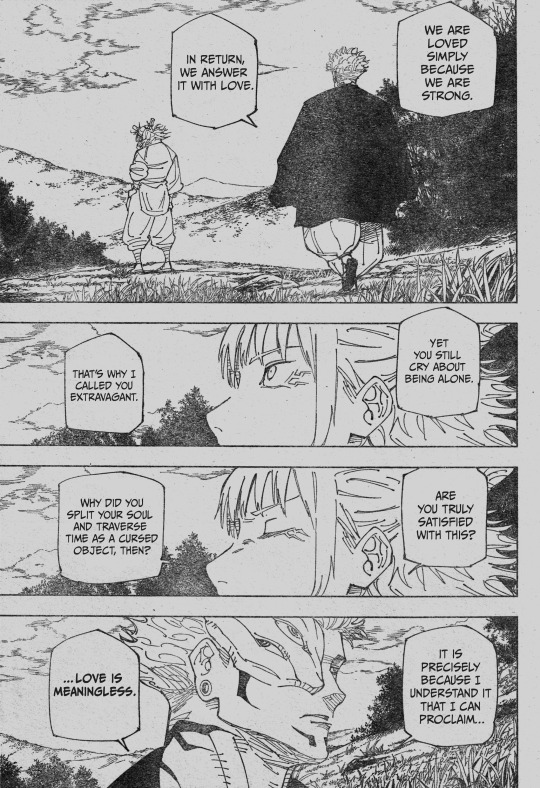
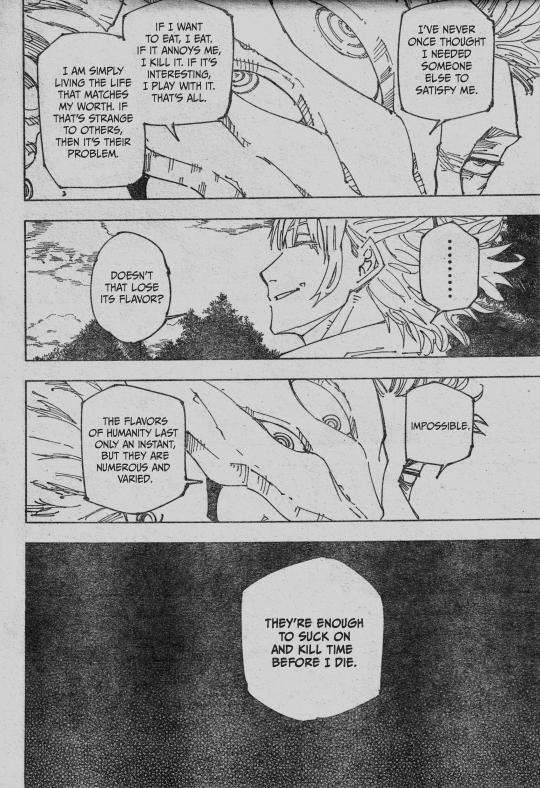
Now I’m not sure how Sukuna perceives or even experiences this “Love”, because I think he has a rather very warped idea of it. I do think that this definition of love is similar to the one that Gojo also understands, but I don’t think he knows what “love” truly is. I’m not sure how I could comment on this, but I do think that Sukuna’s emotionally starved, whether he realises that or not.
Because, like Kashimo himself asked Sukuna “What is the point of dividing your soul into 20 different parts and then traversing across time if you’re satisfied with this?” we do not know the answer to that yet.
But many people have speculated that “Black Box” panels in JJK manga represent a curse (either self-inflicted or put by someone) on the speaker. Like, take a look over here where Sukuna reiterates the same dialogue, except it looks like he’s trying to reassure himself:

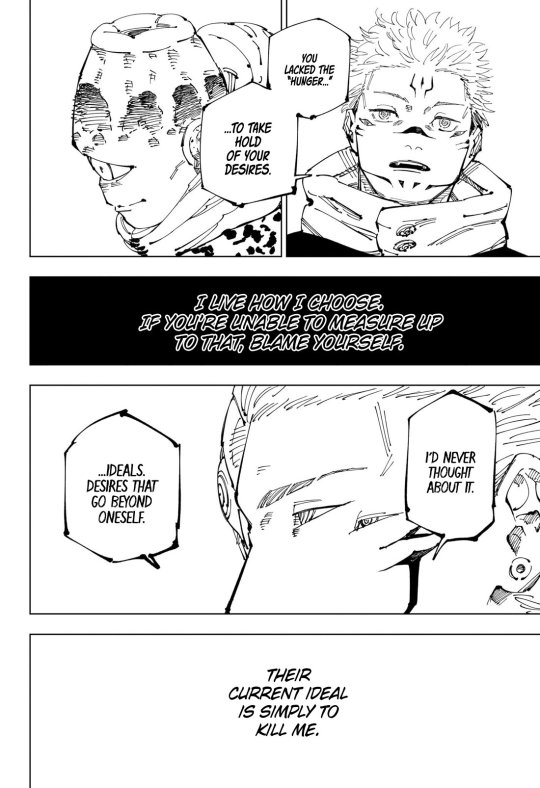
This once again shows that Sukuna has only ever strived for himself, in the same hedonistic fashion, to a very very extreme degree. It is possible that he's been lacking something, and he himself does not realise that he’s lacking it. Maybe it was this subconscious feeling, that led to Sukuna agreeing to Kenjaku’s plan of dividing his soul into 20 different parts, and to traverse across time as a Cursed Object.
Sukuna’s an incredibly complex character, and I’m excited to see where this goes. Gege has put extra care in the way he characterizes and depicts Sukuna, and again, I’m really sad that a lot of that characterization gets lost in translation. Still, I’m going to try my best to understand and get the most accurate feel of his character as I possibly can.
If you made it this far, Thank you for reading! And if you would like, please do leave a comment in the tags or replies because I would love to read what other people think of this and just Sukuna in general. I do not see a lot of people doing critical analysis of him, and a lot of his actions are seemingly swept under the rug. I don’t like that, so hopefully this contributes to people focusing more on Sukuna and his character. (/^v^)/ <3
#ryomen sukuna#jjk sukuna#jjk#jujutsu kaisen#sukuna#king of curses#heian era#character analysis#manga#jjk manga#jjk 257#this is...so very long omg im sorry for my huge word vomit#like 1.4k works but i really did felt like i wanted to gather my scattered thoughts into one place and kind of make the connections#not sure if anyone is gonna read this but if they do#thanks for reading! be sure to let me know what u think!#i just love psycho-analysis of my fav characters and being able to really understand the essence of their characters#their emotions their motivations and to finally be able to do that with Sukuna and reading what everyone else have to say about it ahhh#im super excited! We're finally getting close to the Heian Backlore!! rejoice!!#my gut always did tell me he was a tragic character T_T and now we're finally getting the tid bits#also apologies for adding different panels#but i only added the translations i liked#i don't like J*hn W*rry's translation like yuck#so ima wait for Lightning's translation notes~ for further clarifications!
418 notes
·
View notes